Here are 109 handpicked quotes about Venice in Italy.
Since its foundation over 1,600 years ago, the famous City of Water has always appealed to the popular imagination and has been a constant source of inspiration for many poets, writers, historians, statesmen, and travellers.
They were charmed by Venice’s unique location in the heart of the Venetian Lagoon. They fell in love with its exquisite architecture and art. And they were deeply intrigued by the peculiar traits of its character as a republic that flourished over 11 centuries of independence based on strong commercial interests and the rule – both literal and through exerting political influence – over vast swathes of sea and land.
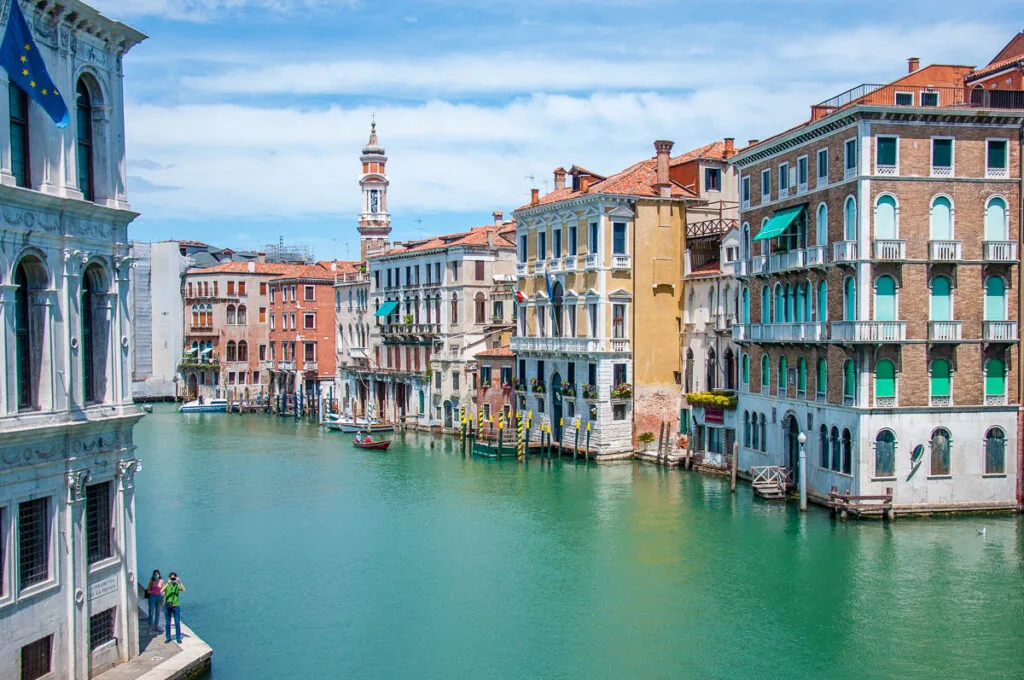
So, over the last millennium had a half, the most famous and the most insightful authors, politicians, and commentators of history and art in Italy, Europe, and beyond had something to say about Venice. Their words reveal to us a place that is like no other in the world. Geographically unique, historically powerful, then reduced to a shadow of its former self to eventually becoming one of the most potent travel magnets on the Earth.
In 537, the Roman official Cassiodorus called Venice ‘praiseworthy’. For the 14th-century poet and humanist Petrarch, Venice was ‘another world’. Marino Sanuto the Younger – the Venetian historian and diarist of the 15th/16th centuries – sang its praises as citta’ excelentissima or most excellent city in English. And in his travel book The Innocents Abroad, published in 1869, the American writer Mark Twain refers to it – not without a touch of irony – as the Queen of the Republics and then categorises her both as ‘decayed’ and ‘princeliest’ within the same breath.
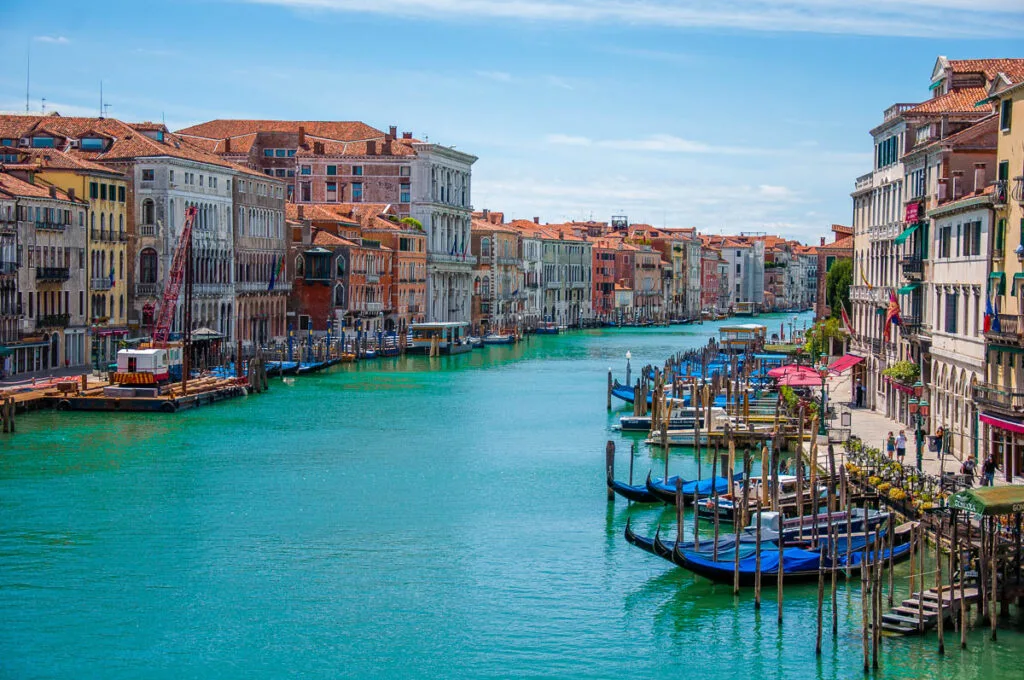
Venice is a baffling city. It’s beautiful and forlorn, strange and unique. It has many hidden layers, yet it’s treated by many as a tourist cliche that can be seen and done in a day. The City of Canals appeals to both your heart and your mind, however, it ravenously keeps its deepest, most precious secrets.
A literal and figurative maze, Venice makes it its goal to disorient you so that to truly delve into everything it has to offer you need dedication and time. So, a good way to start learning about Venice is by reading the writings of celebrated historic figures about it. In a way, they offer a shortcut to the heart of the City of the Lagoon and yet they add even more to its mystery.
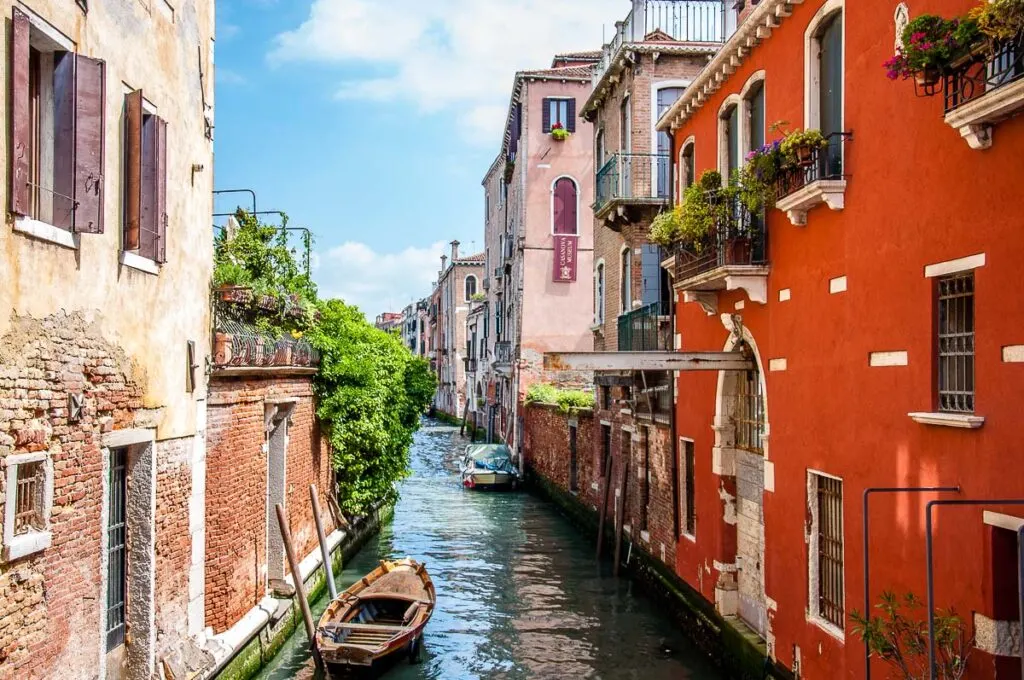
Reading the quotes about Venice by the people who got to know it intimately is a beautiful way to explore and fall in love with Venice as it is – both masked and unmasked, both glorious and with peeling walls.
I have collected these 109 quotes about Venice over the many years that I have been interested in this beautiful and intriguing city. A few of them are very well-known while most are quite obscure yet very insightful. Some come from travel books that were first published over 200 years ago. Others are from literary and political works written over the last two millennia. And yet others were uttered by our contemporaries.
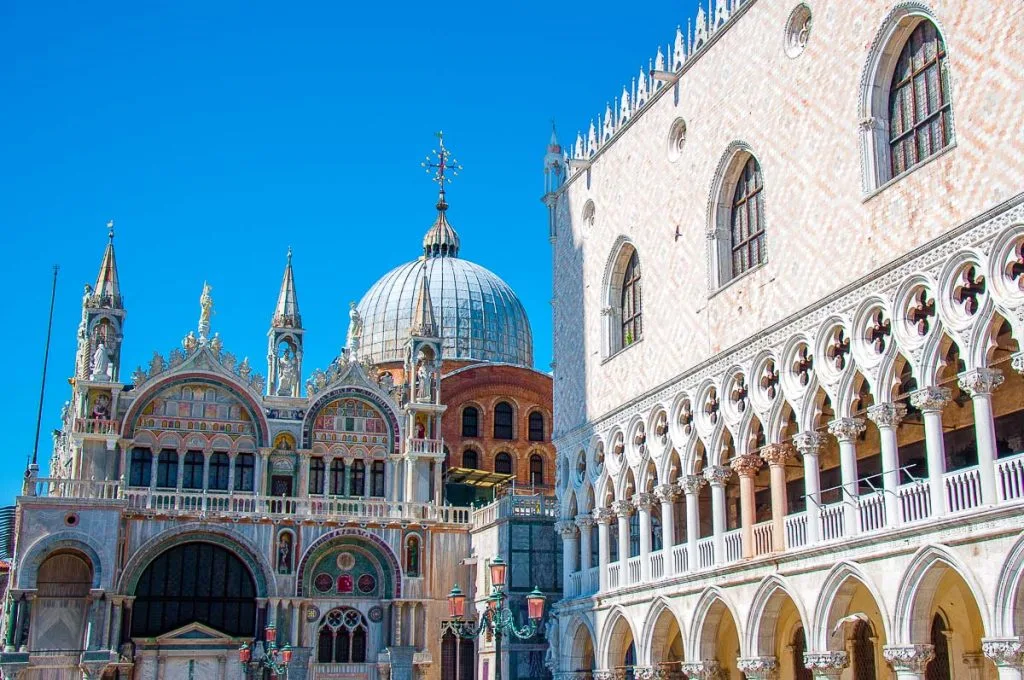
Among the authors of these quotes about Venice are Venetian statesmen, Italian poets, English and French historians and writers, thinkers from all over the world.
To make your browsing easier and more logical, I have organised these quotes about Venice in the following groups: Venice’s Unique Location and Character; Beauty of Venice; Seeing Venice for the First Time; History and Political Structure of Venice; Character and Appearance of the Venetians; Venetian Gondolas and Gondoliers; Venice’s Contribution to the Sciences, Book Publishing, Arts, and Music; Venetian Language; Venice’s Landmarks and Unique Urban Fabric; Islands in the Venetian Lagoon; and Traditional Venetian Celebrations.
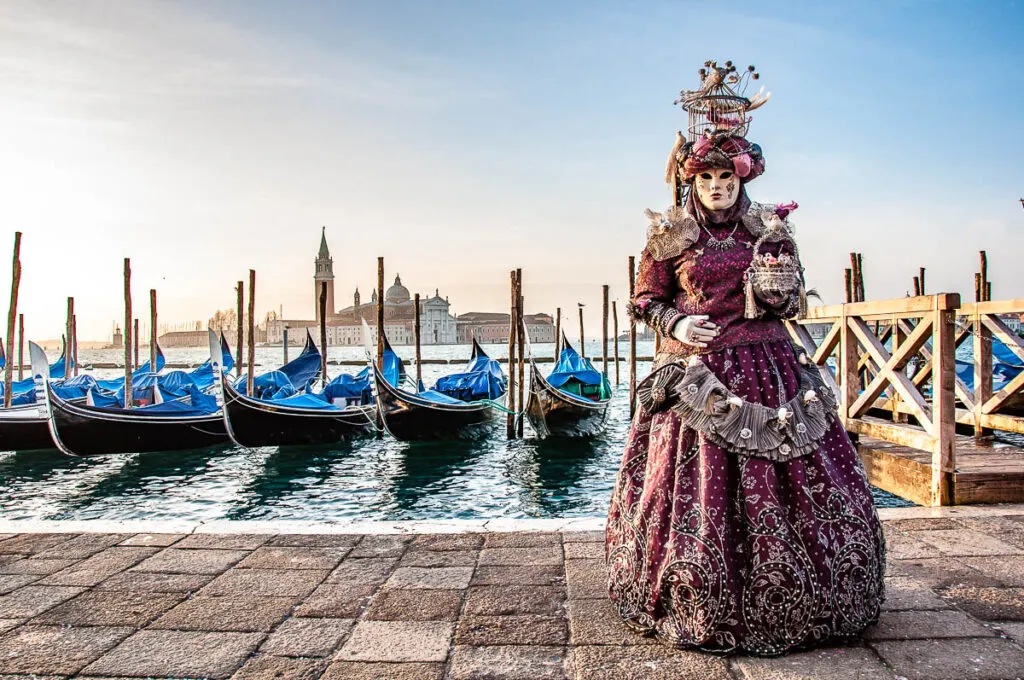
To balance it all, there are also quotes about Not Liking Venice and Noticing Venice’s Negatives as well as about Crowding and Overtourism in Venice.
A healthy portion of Venetian and Italian proverbs and sayings about Venice bring this blog post to a close. Feel free to scroll up and down to read the quotes that correspond to the side of Venice you are interested in.
Each one of these quotations reveals Venice in a new light. Together, they are a source of inspiration to get to know the City of Canals for yourself and to come up with your own words about it.
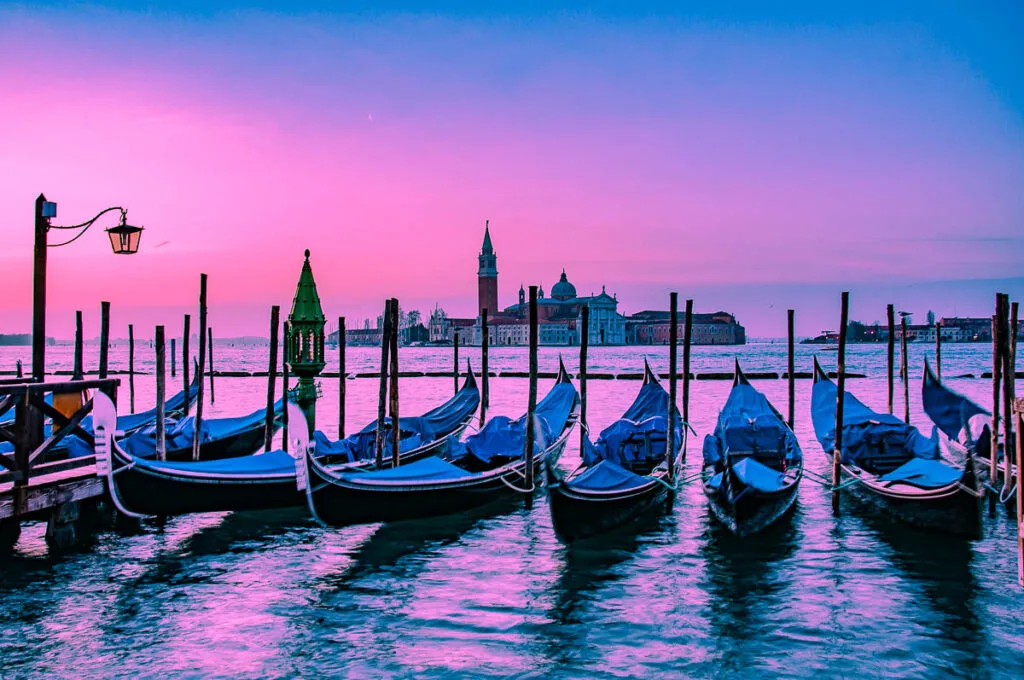
If you have an interest in Venice and would like to visit this unique Italian city as soon as possible, then, have a look at these blog posts, too:
- 45 Essential Tips for Venice, Italy – A Must-Read for First-Time Visitors
- 20 Venice Landmarks You Simply Have to See (With Map, Photos, and Curious Facts)
- Venetian Place Names or How to Navigate Venice Like a Local
Now, let’s start!
109 Inspiring Quotes about Venice – Italy’s City of Water
Pin for Later!
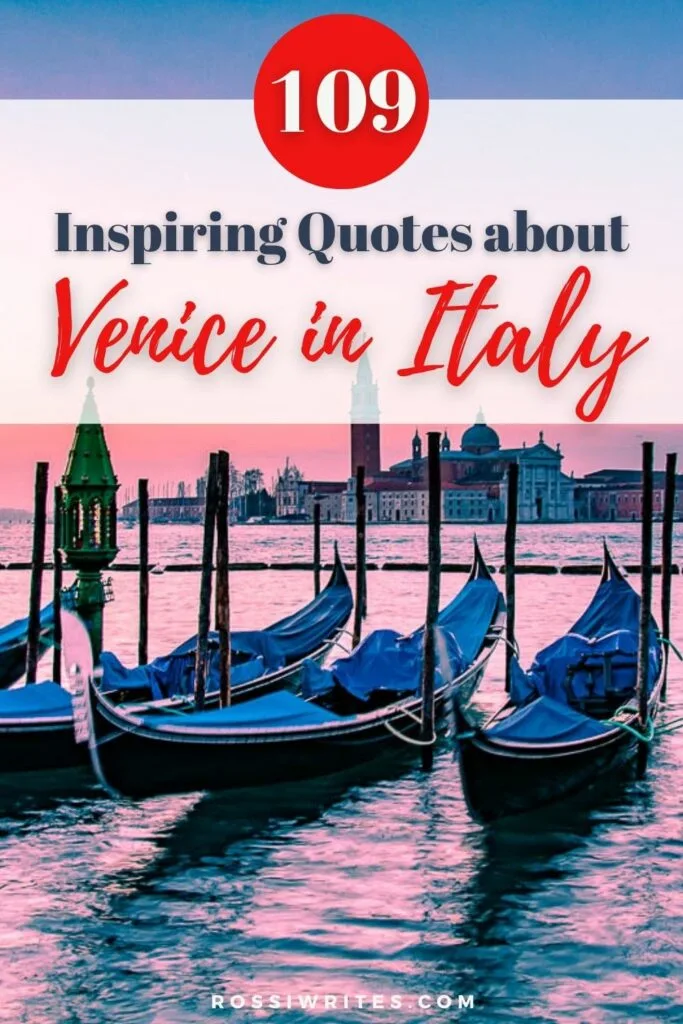
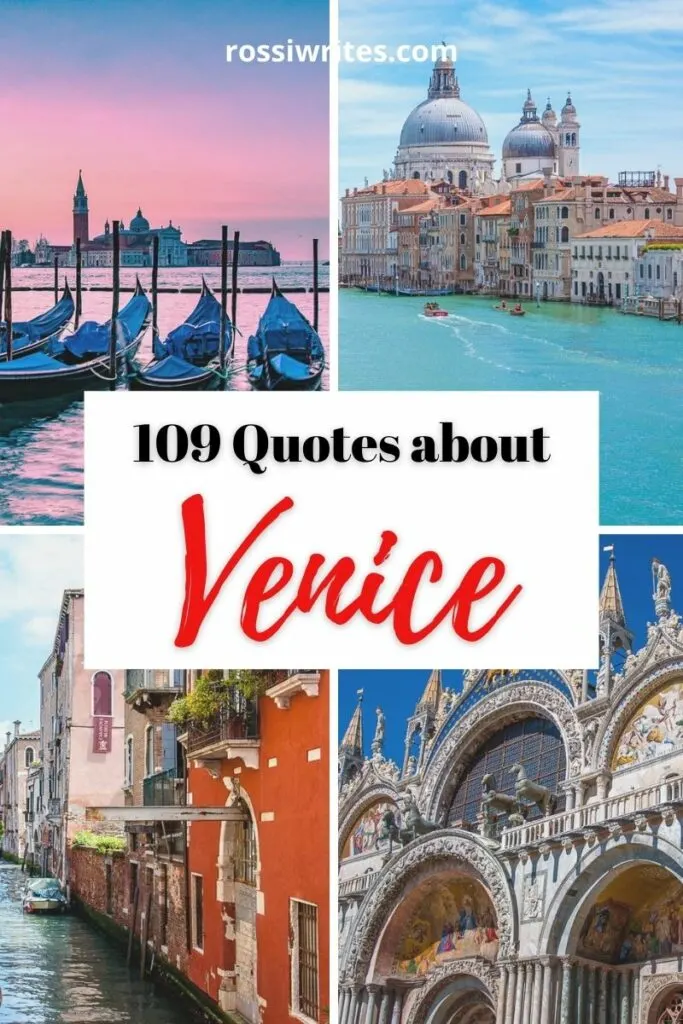
Quotes about Venice’s Unique Location and Character
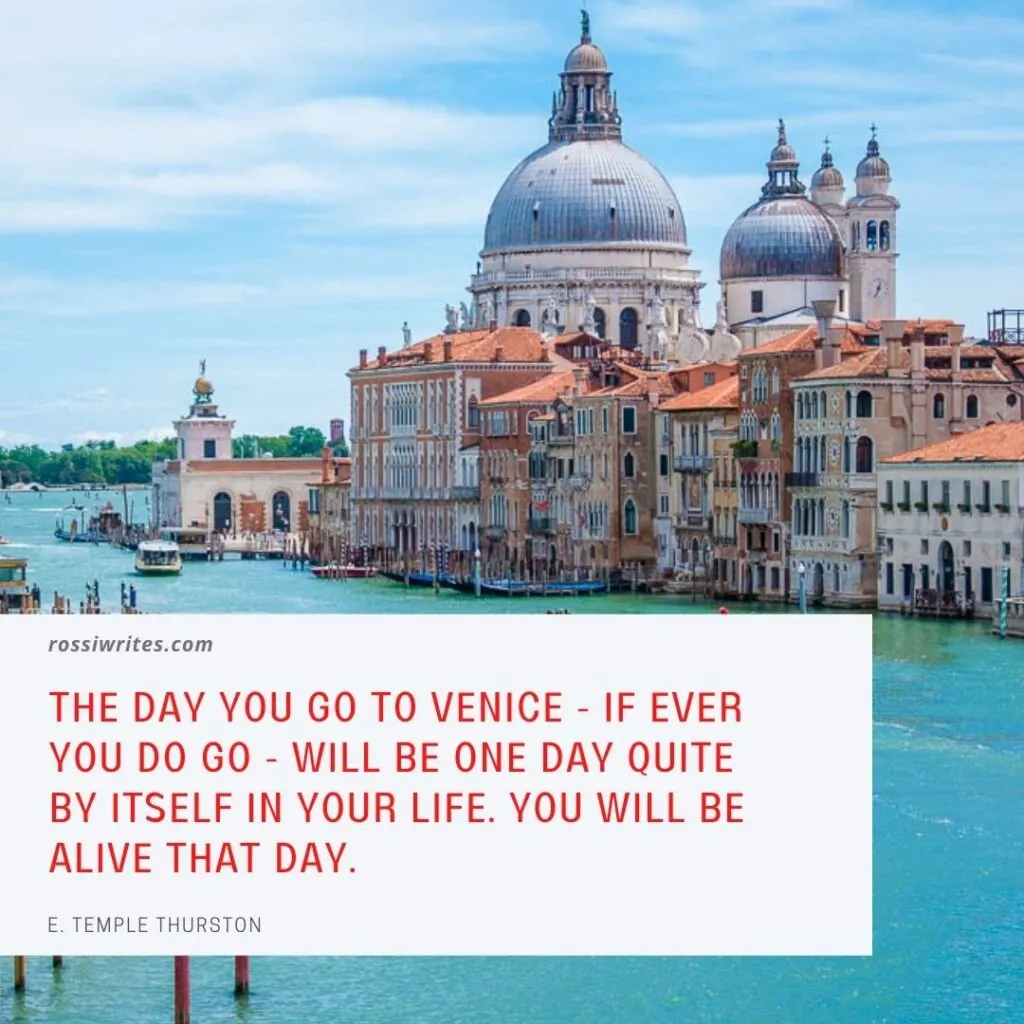
1. “The day you go to Venice – if ever you do go – will be one day quite by itself in your life. You will be alive that day.”
– The City of Beautiful Nonsense by E. Temple Thurston (1879-1933) – British poet, playwright, and author. Read / Buy
2. “With much delight, I look back to Venice, that grand creation that sprang out of the bosom of the sea, like Minerva out of the head of Jupiter.”
– Letters from Switzerland and Travels in Italy by Johann Wolfgang von Goethe (1749-1832) – German poet, novelist, playwright, and scientist. Read / Buy
3. “INVIOLATE shores I loved so warmly well!
Shores more than others beautiful and blest!
Of an illustrious race the tranquil nest;
Of our dear liberties the faithful cell.”
– To Venice – a sonnet by Gaspara Stampa (1523-1554) – The greatest woman poet of the Italian Renaissance. Read / Buy
4. “In the northern angle of the Adriatic is a gulf, called lagune, in which more than sixty islands of sand, marsh, and seaweed have been formed by a concurrence of natural causes. These islands have become the City of Venice, which has lorded it over Italy, conquered Constantinople, resisted a league of all the kings of Christendom, long carried on the commerce of the world, and bequeathed to nations the model of the most stable government ever framed by man.”
– Histoire de la République de Venise by Count Pierre Daru (1767-1829) – French soldier, historian, statesman, and poet. Read (in French) / Buy (in French)
5. “What a city! To think that man driven by the hand of circumstance – the dread of destruction – should have sought out these mucky sea islands and eventually reared as splendid a thing as this. “The Veneti driven by the Lombards,” reads my Baedeker, “sought the marshy islands of the sea.” Even so. Then came hard toil, fishing, trading, the wonders of the wealth of the East. Then came the Doges, the cathedral, these splendid semi-Byzantine palaces. Then came the painters, religion, romance, history. Today here it stands, a splendid shell, reminiscent of its former glory. Oh, Venice! Venice!”
– A Traveler at Forty by Theodore Dreiser (1871-1945) – American novelist and journalist. Read / Buy
6. “[…] this Citty well deserved our admiration, being the most wonderfully placed of any in the world, built on so many hundred islands, in the very Sea, and at good distance from the Continent. It has no fresh water except what is reservd in cisterns from raine, and such as is daily brought from terra firma in boates, yet there was no want of it, and all sorts of excellent provisions were very cheape.”
– The Diary of John Evelyn by John Evelyn (1620-1706) – English writer, courtier, and prolific diarist. Read / Buy
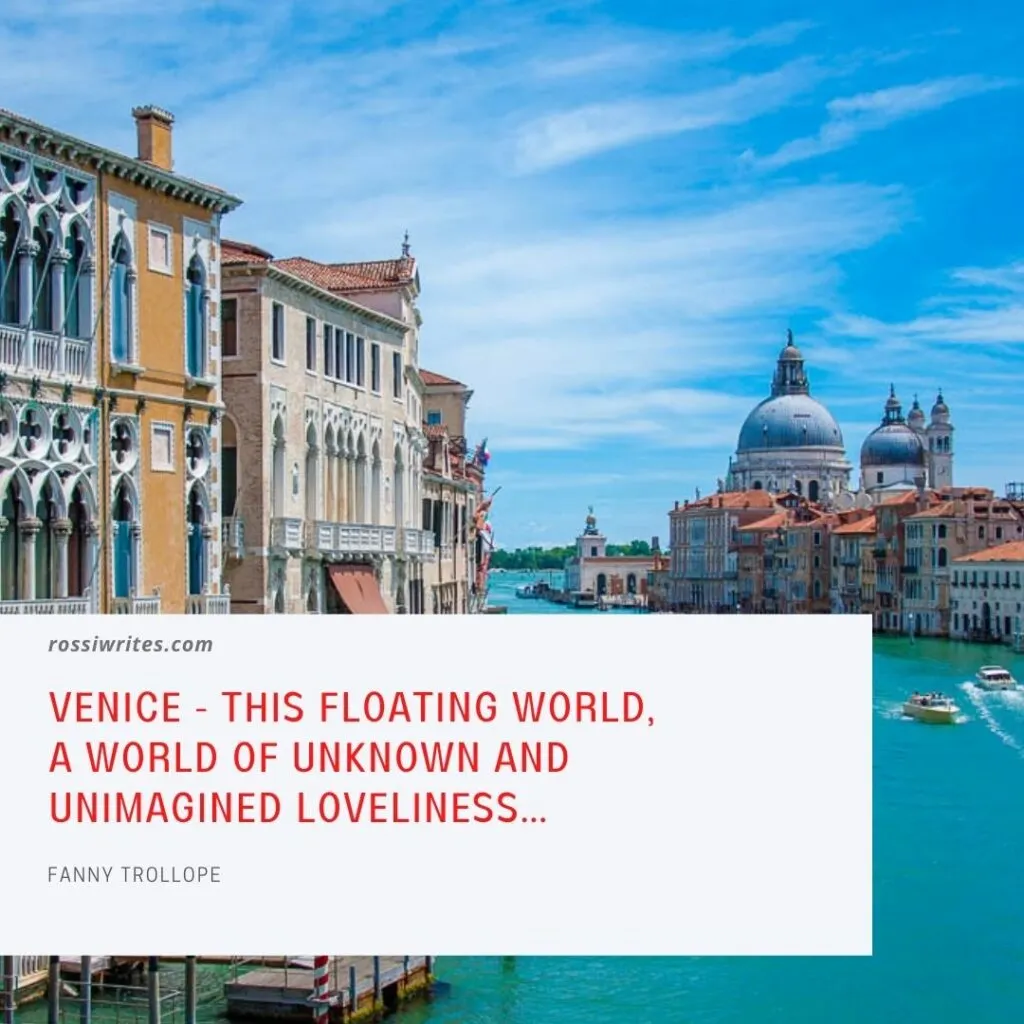
7. “(…) if there be a spot upon God’s lovely earth which does not owe its charms to Nature, it is Venice. The sky is bright, and the air is clear, but beyond this Nature has wondrously little to do with the enchantment that seizes on the senses the moment you enter the dominion of this ‘Sea Cybele’.
There is a freshness of wonder that attends every part of the progress through this floating world… a piquant novelty, an untasted pleasure, that can only be described by comparing it with what we may presume might be the effect of magic, if some great enchanter took possession of us, and carried us through a world of unknown and unimagined loveliness, taking care to show us nothing that we had ever seen before.”
– A Visit to Italy, Vol. II by Fanny Trollope (1779-1863) – English author of 40 books and the bestseller Domestic Manners of the Americans.
8. “A Venetian writer, Sansovino, calls his history of the city ‘Venezia, citta’ nobilissima e singolare‘: nobilissima in its pomp of palaces and the splendour of its decorative art, singolare for the beauty of its natural position, floating on the waters between sea and sky and Alps.”
– Venice – An Historical Sketch of the Republic by Horatio F. Brown (1854-1926) – Scottish historian who wrote about the history of Venice and Italy. Read / Buy
9. “This most noble City, on account of its location, freeing it from enemies, and for the freedom which citizens and very strangers have, and for manifold other causes, is worthily called in Latin Venetia, as it were Veni Etiam, that is ‘Come again!’.”
– Itinerary by Fynes Moryson (1566-1630) – English traveller, travel writer, and diarist. Read / Buy
10. “I think if one lived years in Venice there would still be half of its treasures to explore.”
– In private correspondence of Effie Gray (1828-1897), wife of John Ruskin (1819-1900), the Scottish-English polymath, writer, art critic, and author of the seminal work The Stones of Venice
11. “Venice succumbs to time, like every thing that has a phenomenal existence.”
– Letters from Switzerland and Travels in Italy by Johann Wolfgang von Goethe (1749-1832) – German poet, novelist, playwright, and scientist. Read / Buy
12. “Venice still lives, and the world still prostrates itself in wonder before her winged lion, in whose name so many great and beautiful works have been completed.”
– Venezia by Henriette Perl writing under the pen name Henry Perl (1845-1915) – Austrian writer. Read / Buy
Quotes about the Beauty of Venice
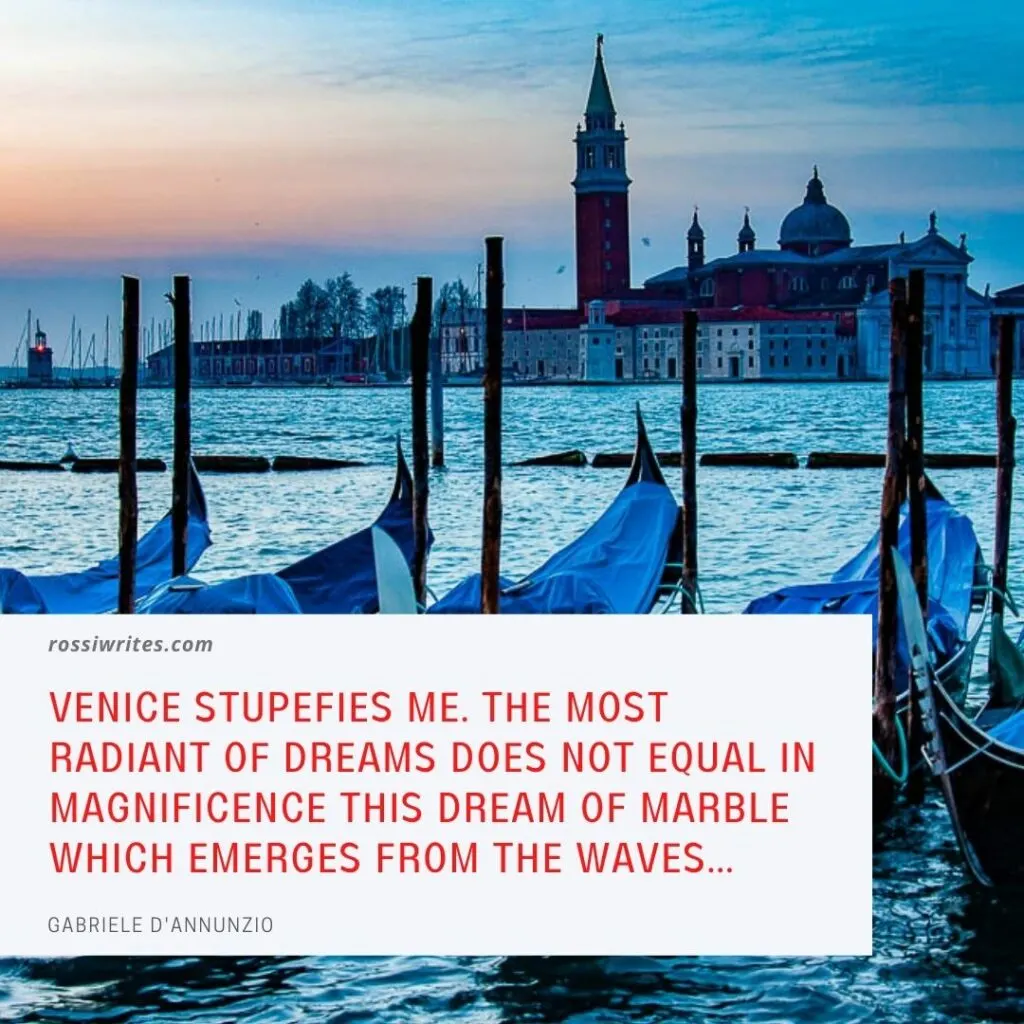
13. “Venice stupefies me. The most radiant of dreams does not equal in magnificence this dream of marble which emerges from the waves and blossoms in an illusionary sky.”
– The Triumph of Death by Gabriele D’Annunzio (1863-1938) – Italian poet, playwright, journalist, aristocrat, fighter pilot, and army officer. Read / Buy
14. “I think if there is a heaven on earth, it is Venice in spring.”
– A Traveler at Forty by Theodore Dreiser (1871-1945) – American novelist and journalist. Read / Buy
15. “There is something so different in Venice from any other place in the world, that you leave at once all accustomed habits and everyday sights to enter enchanted ground. (…) It is a place where you may dream away your life, quite forgetful of the rubs, thorns, and hard knocks of more bustling cities. (…) Thus I dwell on the beauty, the majesty, the dreamy enjoyments of Venice.”
– Rambles in Germany and Italy in 1840, 1842 and 1843 by Mary Wollstonecraft Shelley (1797-1851) – English novelist and author of the Gothic novel Frankestein. Read / Buy
16. “Among the charms of Venice is her capacity for absorbing and subordinating everything to her own beauty, and harmonizing with herself the meanest and commonest of her surroundings. (…) I contend that Venice has the power of making the commonest things picturesque and poetic.”
– La Dogaressa di Venezia by Pompeo Molmenti (1852-1928) – Italian writer, historian, and politian. Read (in Italian) / Buy
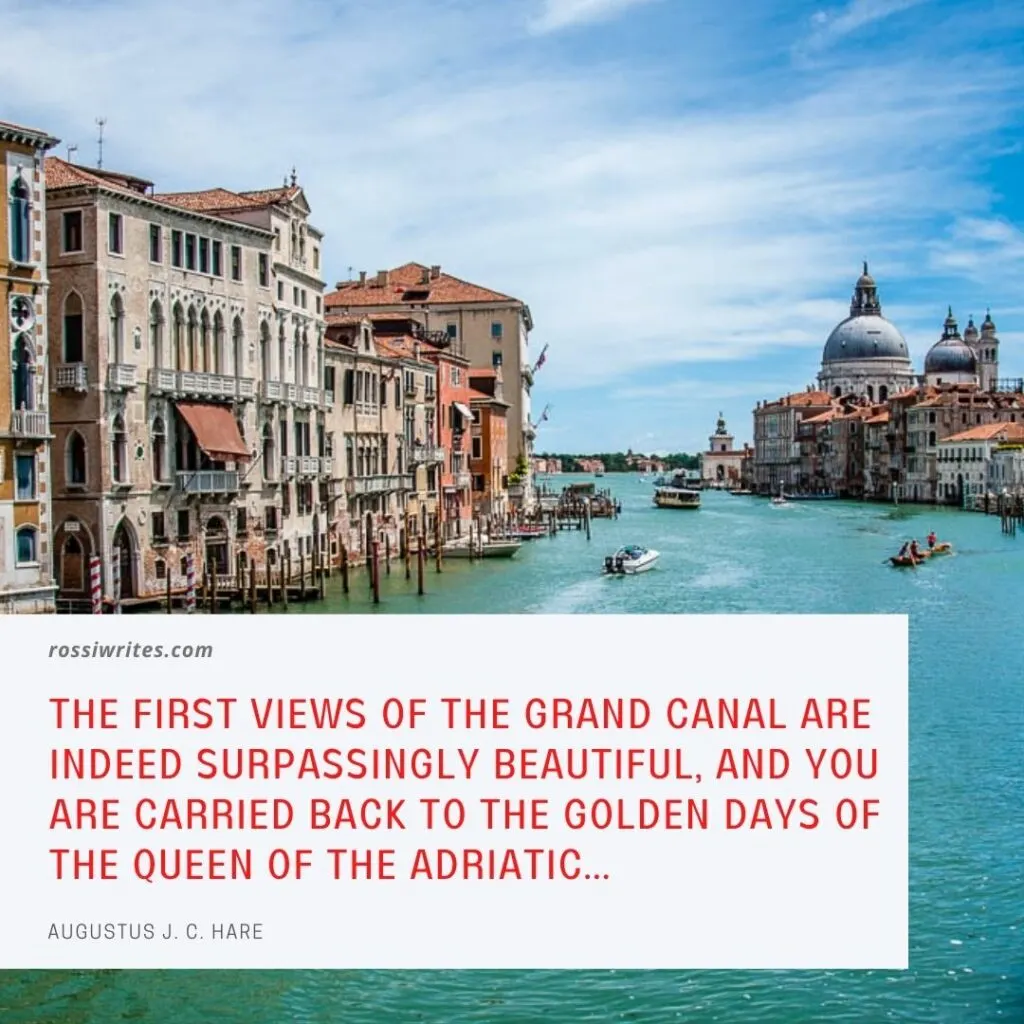
17. “It is perhaps best, and no mere romantic idea, to enter Venice for the first time by moonlight. Then all the shabby detail, all the ruin and decay, and poor unartistic repairs of the grand old buildings are lost, and the first views of the Grand Canal are indeed surpassingly beautiful, and you are carried back to the golden days of the Queen of the Adriatic.”
– Venice by Augustus J. C. Hare (1834-1903) – English writer.
18. “That was Venice, the flatteringly and suspiciously beautiful – this city, half legend, half snare for strangers.”
– Death in Venice by Thomas Mann (1875-1955) – German novelist, social critic, and Nobel Prize in Literature laureate. Read / Buy
19. “In the glare of the day there is little poetry about Venice, but under the charitable moon her stained palaces are white again, their battered sculptures are hidden in shadows, and the old city seems crowned once more with the grandeur that was hers five hundred years ago. […] In the treacherous daylight we see Venice decayed, forlorn, poverty-stricken, and commerceless – forgotten and utterly insignificant. But in the moonlight, her fourteen centuries of greatness fling their glories about her, and once more is she the princeliest among the nations of the earth.”
– The Innocents Abroad by Mark Twain (1835-1910) – American writer, humorist, and publisher. Read / Buy
20. “You’ve got to see Venice,” he began, “you’ve got to see a city of slender towers and white domes, sleeping in the water like a mass of water lilies. You’ve got to see dark water-ways, mysterious threads of shadow, binding all these flowers of stone together. You’ve got to hear the silence in which the whispers of lovers of a thousand years ago, and the cries of men, betrayed, all breathe and echo in every bush. […] You’ve got to see it all in the night – at night, when the great white lily flowers are blackened in shadow, and the darkened water-ways are lost in an impenetrable depth of gloom. You’ve got to hear the stealthy creeping of a gondola and the lapping of the water against the slimy stones as it hurries by.”
– The City of Beautiful Nonsense by E. Temple Thurston (1879-1933) – British poet, playwright, and author Read / Buy
Quotes about Seeing Venice for the First Time
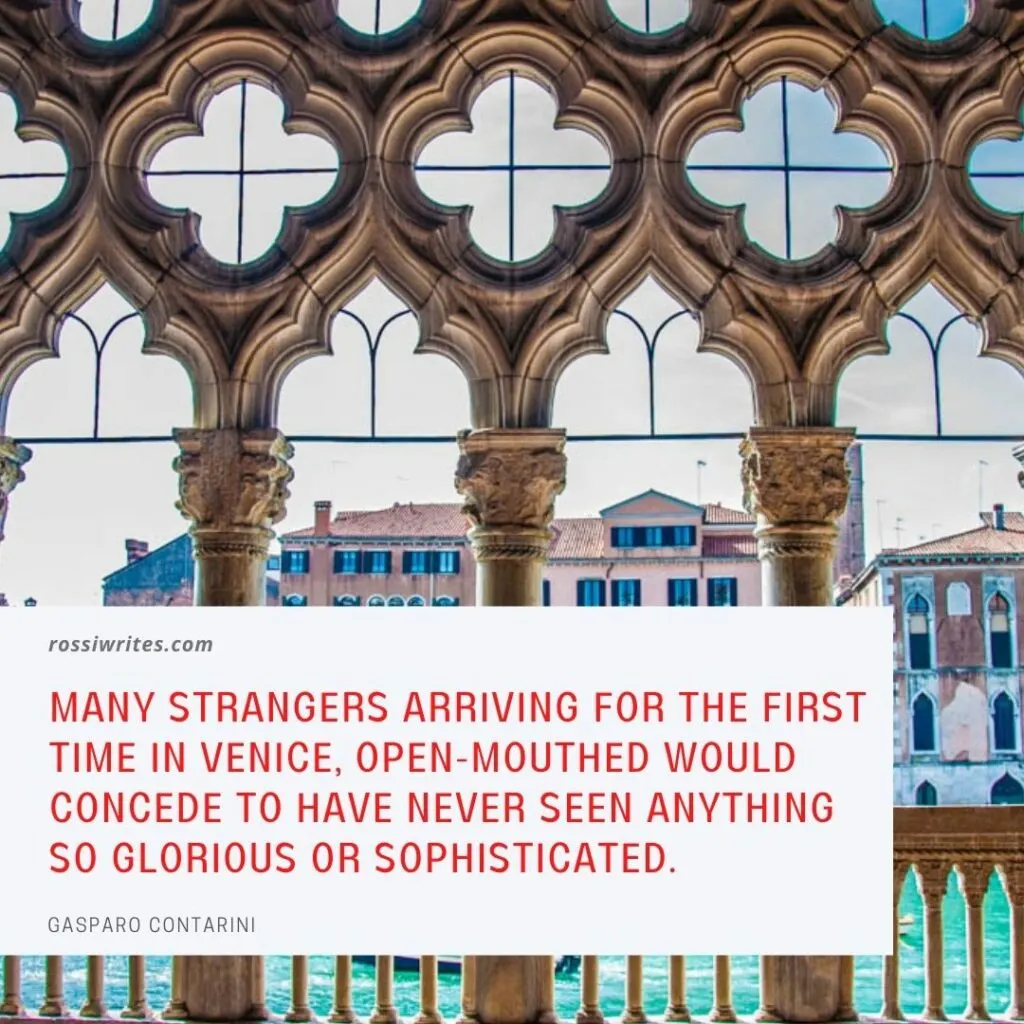
21. “I have oftentimes observed many strangers, men, women, and learned men, who arriving for the first time in Venice, and beholding its beauty and magnificence, were stricken with such a great admiration and amazement, that they open-mouthed would concede to have never seen anything so glorious or sophisticated.”
– The Commonwealth and Government of Venice by Gasparo Contarini (1483-1542) – Italian diplomat, cardinal, and Bishop of Belluno. Read
22. “Venice! Is there a city more admired, more celebrated, more sung by poets, more desired by lovers, more visited and more illustrious?
Venice! Is there a name in all the languages of humanity that makes us dream more than that one? […]
Venice! That single word seems to send an exaltation exploding in the soul, it excites everything poetic within us, it provokes all our faculties of admiration. And when we arrive in this unique city, we inevitably study it with forwarned and ravished eyes, we look upon it with our dreams.”
– Venise by Guy de Maupassant (1850-1893) – French author and writer of celebrated short stories. Read (in French)
23. “For I think there can be nothing else in the world so full of glittering and exquisite surprise, as that first glimpse of Venice which the traveller catches as he issues from the railway station by night, and looks upon her peerless strangeness. […]
There lies before you for your pleasure the spectacle of such singular beauty as no picture can ever show you nor book tell you, – beauty which you shall feel perfectly but once, and regret forever. […]
There I had arrived in Venice, and had felt the influence of that complex spell which she lays upon the stranger. I had caught the most alluring glimpses of the beauty which cannot wholly perish while a fragment of her sculptured walls nods to its shadow in the canal; I had been penetrated by a deep sense of the mystery of the place […].”
– Venetian Life by William Dean Howells (1837-1920) – American journalist, realist novelist, literary critic, and playwright. Read / Buy
24. “I loved Venice long before ever I stepped into a gondola or wandered under the arcades of the Procuratie; I loved the City in the Sea for years before beholding it; and I love it now. I should like to live there in the spring and the autumn. I should like to die there, and be carried in a gondola to the Island of Tombs (…).”
– La Dogaressa di Venezia by Pompeo Molmenti (1852-1928) – Italian writer, historian, and politian. Read (in Italian) / Buy
25. “On my page in the Book of Fate, there was written that on the evening of the 28th of September, by five o’clock, German time, I should see Venice for the first time, as I passed from the Brenta into the lagunes, and that soon afterwards, I should actually enter and visit this strange island-city, this heaven-like republic. So now, Heaven be praised! Venice is no longer to me a bare and a hollow name, which has so long tormented me […].”
– Letters from Switzerland and Travels in Italy by Johann Wolfgang von Goethe (1749-1832) – German poet, novelist, playwright, and scientist. Read / Buy
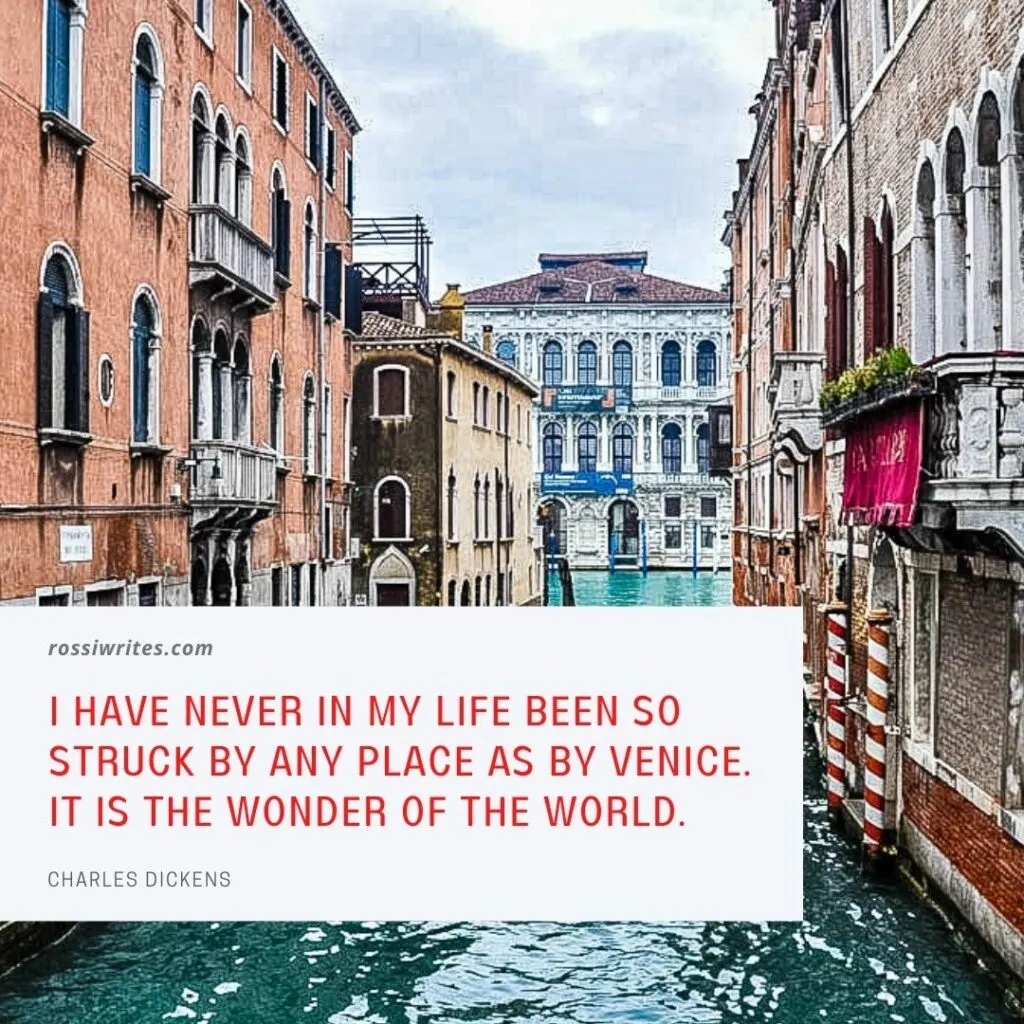
26. “I have never in my life been so struck by any place as by Venice. It is the wonder of the world. Dreamy, beautiful, inconsistent, impossible, wicked, shadowy, d-able old place. I entered it by night, and the sensation of that night and the bright morning that followed is a part of me for the rest of my existence.”
– In a letter sent by Charles Dickens (1812-1870) – English writer and author of timeless classics such as A Christmas Carol, David Copperfield, and Great Expectations
27. “To taste in all their fullness his first impressions of Venice, the traveller should arrive there by sea, at mid-day, when the sun is high. By degrees, as the ship which carries him enters the channels, he will see the unparalleled city emerging from the lap of the lagoon, with its proud campaniles, its golden spires, its gray or silvery domes and cupolas.”
– Venice – Its History, Art, Industries, and Modern Life by Charles Yriarte (1832-1898) – French writer, reporter, and editor. Read / Buy
28. “We stepped into a gondola, our bags being loaded in afterwards. It was a singularly romantic situation, when you come to think of it: entering Venice by moonlight and gliding off in a gondola in company with an unknown and charming Italian girl who smiled and sighed by turns and fairly glowed with delight and pride at my evident enslavement to the beauty of it all.
She was directing the gondolier where to leave her when I exclaimed, “Don’t leave me, please! Let’s do Venice together!”
She was not offended. She shook her head, a bit regretfully I like to think, and smiled most charmingly. “Venice has gone to your head. Tomorrow you’ll forget me!”
– A Traveler at Forty by Theodore Dreiser (1871-1945) – American novelist and journalist. Read / Buy
29. “Venice astonishes more than it pleases at first sight: it looks a city under water; and one can scarce admire the ambition which disputed this space with the sea. […] Still much originality may be found in Venice.”
– Corinna, Or Italy by Madame de Staël (1766-1817) – Swiss-French writer and philosopher. Read / Buy
30. “[…] afloat on the placid sea a league away, lay a great city, with its towers and domes and steeples drowsing in a golden mist of sunset.”
– The Innocents Abroad by Mark Twain (1835-1910) – American writer, humorist, and publisher. Read / Buy
Quotes about Not Liking Venice and Noticing Venice’s Negatives
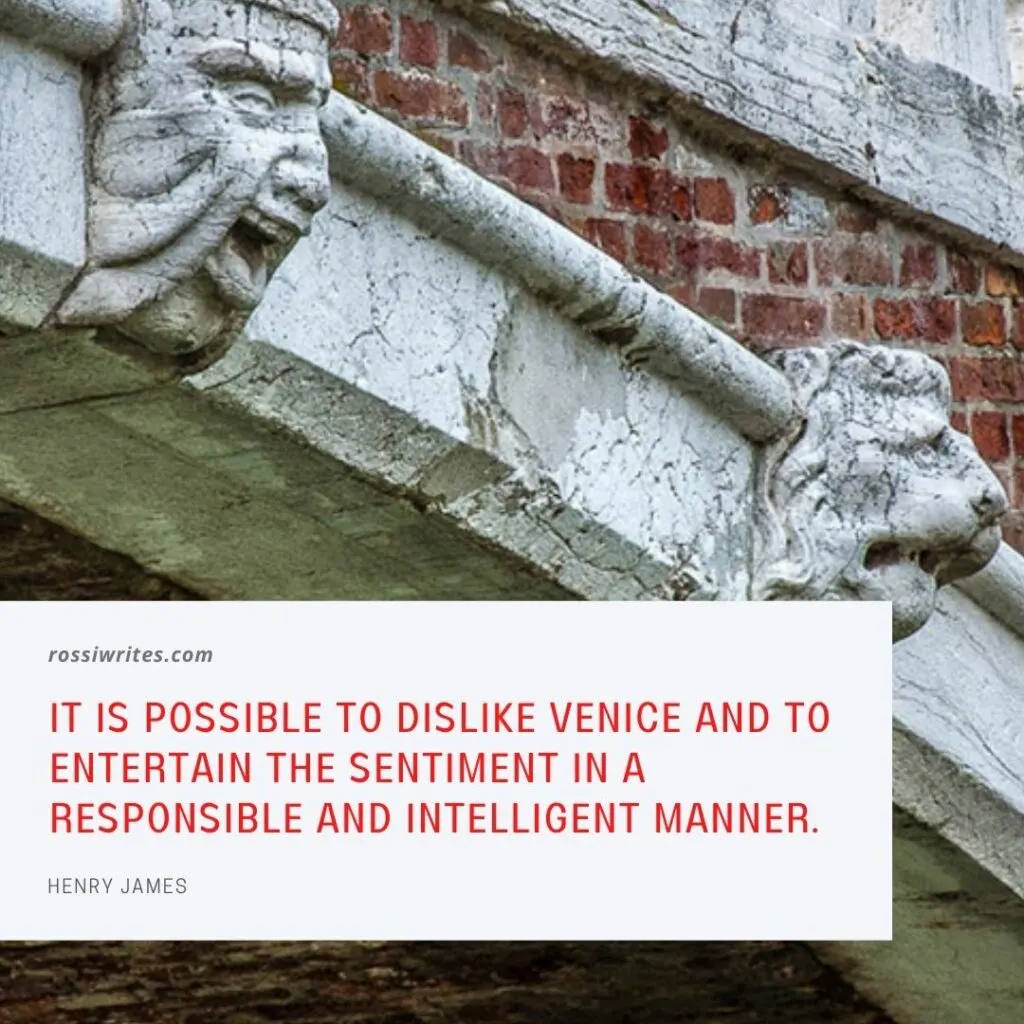
31. “It is possible to dislike Venice and to entertain the sentiment in a responsible and intelligent manner. There are travellers who think the place odious, and those who are not of this opinion often find themselves wishing that the others were only more numerous.”
– Italian Hours by Henry James (1843-1916) – American-born British author Read / Buy
32. “Connie looked at Venice far off, low and rose-coloured upon the water. Built of money, blossomed of money, and dead with money. The money-deadness! Money, money, money, prostitution and deadness.”
– Lady Chatterley’s Lover by D.H. Lawrence (1885-1930) – English writer and poet.
33. “My chief care in choosing my lodging is always to avoid a thick and stinking air; and these beautiful cities, Venice and Paris, very much lessen the kindness I have for them, the one by the offensive smell of her marshes, and the other of that of her dirt.”
– The Works of Michael de Montaigne; Comprising His Essays, Letters, and Journey Through Germany and Italy by William Hazlitt (1834-1913) – English lawyer, bibliographer, editor, and writer. Michel de Montaigne (1533-1592) was one of the most significant philosophers of the French Renaissance. Read / Buy
34. “It may not be a discovery, but it is a fact not often noticed, that there is an every-day Venice which is decidedly vulgar, – which means that it is not all Rialto, Bridge of Sighs, Grand Canal, or Doge’s Palace. But, to judge from poems, pictures, and tourists, the city is one beautiful dream, of marble and bronze, of jasper and vermilion, of pictures and the sculptor’s breathing models. […] Yet there is another Venice which artists rarely touch […] And this Venice has not a solitary element of romance or beauty about it. Nothing of marble or mosaic here; nothing of gold or purple; only squalor […]”
– Plebeian Life in Venice by Horace St. John (1830-1888) – French-English journalist, editor, and author. This essay was published in the book ‘With the World’s Great Travellers’. Read / Buy
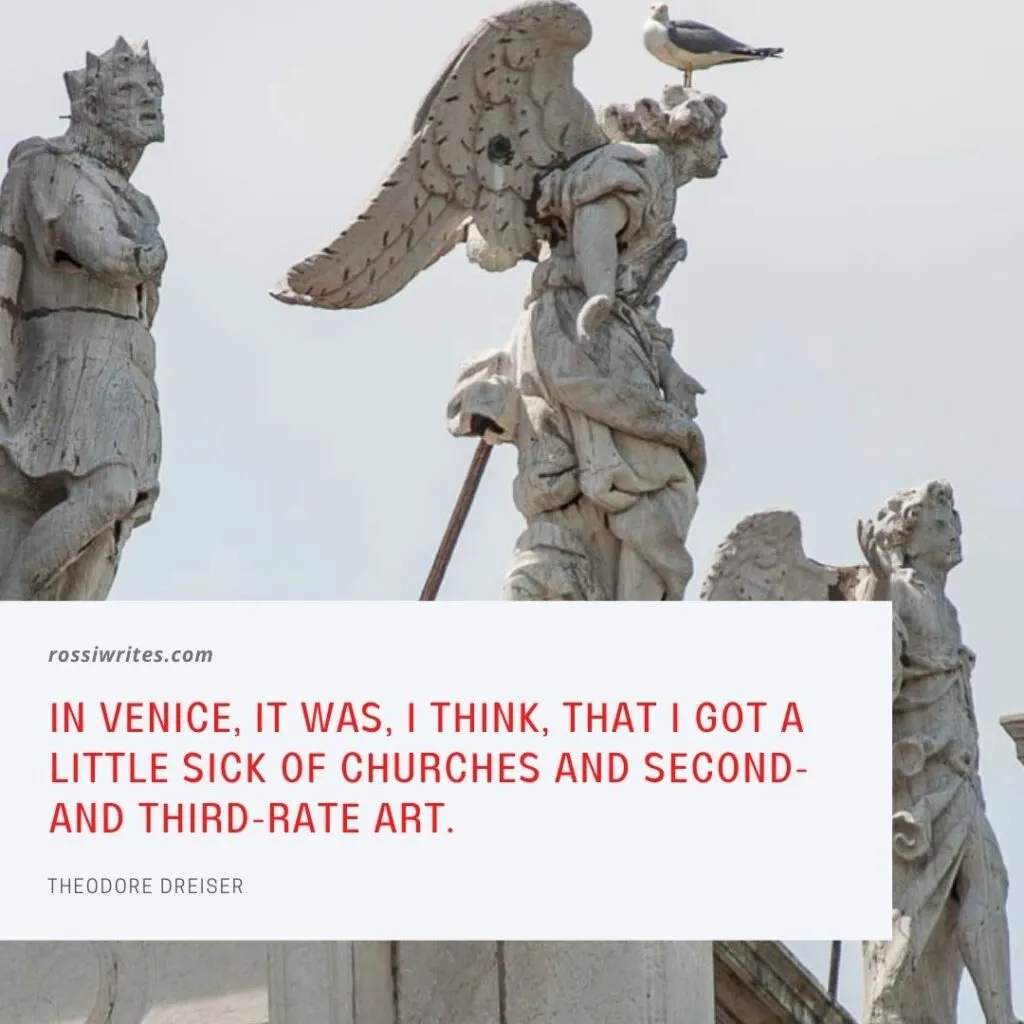
35. “In Venice it was, I think, that I got a little sick of churches and second- and third-rate art. The city itself is so beautiful, exteriorly speaking, that only the greatest art could be tolerated here, yet aside from the Academy, which is crowded with canvases by Bellini, Tintoretto, Titian, Veronese and others of the Venetian school, and the Ducal Palace, largely decorated by Tintoretto and Veronese, there is nothing, save of course St. Mark’s. Outside of that and the churches of the Salute and San Giorgio, – both bad, artistically, I think, – there are thirty-three or thirty-four other churches all with bits of something which gets them into the catalogues, a Titian, a Tintoretto, a Giorgione or a Paolo Veronese, until the soul wearies and you say to yourself – “Well, I’ve had about enough of this – what is the use?”
– A Traveler at Forty by Theodore Dreiser (1871-1945) – American novelist and journalist. Read / Buy
36. “Water and marble and that silentness
Which is not broken by a wheel or hoof;
A city like a water-lily, less
Seen than reflected, palace wall and roof,
In the unfruitful waters motionless,
Without one living grass’s green reproof;
A city without joy or weariness,
Itself beholding, from itself aloof.”
– Venice by Arthur Symons (1865-1945) – Welsh poet, critic, and editor.
37. “Venice! It’s a great pleasure to write the word; but I am not sure there is not a certain impudence in pretending to add anything to it. Venice has been painted and described many thousands of times, and of the cities of the world is the easiest to visit without going there. […] There is notoriously nothing more to be said on the subject [of Venice]. Everyone has been there, and everyone has brought back a collection of photographs.”
– Italian Hours by Henry James (1843-1916) – American-born British author. Read / Buy
Quotes about the History and Political Structure of Venice
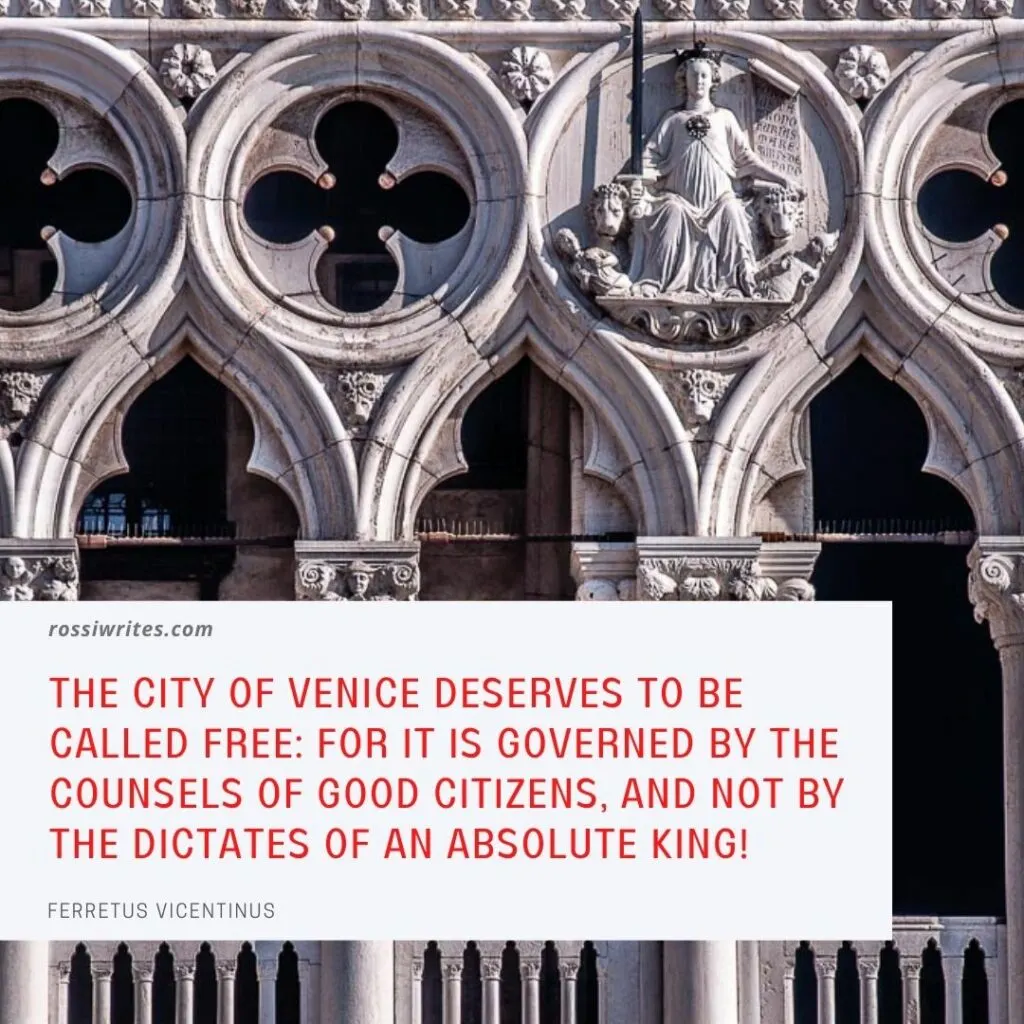
38. “The City of Venice deserves to be called free: for it is governed by the counsels of good citizens, and not by the dictates of an absolute King!”
– Ferretus Vicentinus (1294-1337) – Also known as Ferreto dei Ferreti, medieval historian and chronicler from the city of Vicenza.
39. “I am firmly convinced, therefore, that to set up a republic which is to last a long time, the way to set about it is to constitute it as Sparta and Venice were constituted; to place it in a strong position, and so to fortify it that no one will dream of taking it by a sudden assault; and, on the other hand, not to make it so large as to appear formidable to its neighbours. It should in this way be able to enjoy its form of government for a long time.”
– Discourses on Livy by Niccolo Macchiavelli (1469-1527) – Italian diplomat, author, and philosopher. Read / Buy
40. “Venice, moreover, was the only state in Italy which was enjoying, and for many generations had been enjoying, internal peace. This gave the Venetians a love of comfort, of ease, and of splendour, a refinement of manner, and humaneness of feeling, which made them the first really modern people in Europe.”
– The Venetian Painters of the Renaissance by Bernhard Berenson (1865-1959) – American art historian specialising in the Renaissance. Read / Buy
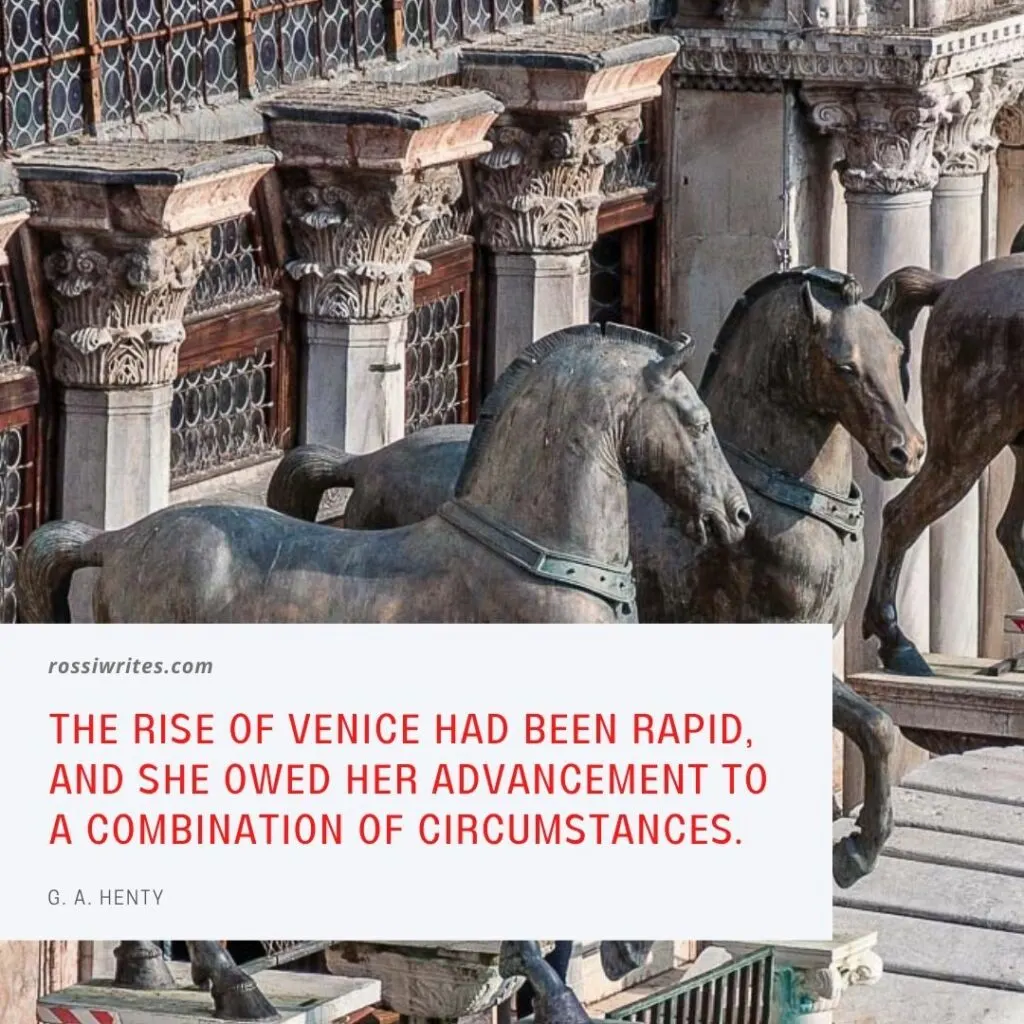
41. “The rise of Venice had been rapid, and she owed her advancement to a combination of circumstances. In the first place, her insular position rendered her almost impervious to attack, and she had, therefore, no occasion to keep on foot any army, and was able to throw all her strength onto the sea, where Genoa was her only formidable rival. In the second place, her mercantile spirit, and her extensive trade with the East, brought in a steady influx of wealth, and her gold enabled her to purchase allies, to maintain lengthy struggles without faltering, and to emerge unscathed from wars which exhausted the resources, and crippled the powers, of her rivals.”
– The Lion of St. Mark – A Story of Venice in the 14th Century by G. A. Henty (1832-1902) – English novelist and war correspondent. Read / Buy
42. “Whilst all the nations of Europe are constituting themselves into monarchies, and progressing along the same lines, with more or less rapidity and success, to unity, the Venetians, on their part, shape their State into a Republic, make its chief, the Doge, the most constitutional of sovereigns, a living emblem of the Republic, intended only to represent her before ambassadors, at public ceremonials, and on the occasion of royal visits, but without any real power, and acting only under constant and permanent control. At first, the Republic is democratic, or, at least, grants certain rights to the people, but it soon becomes aristocratic, and remains so till its fall.”
– Venice – Its History, Art, Industries, and Modern Life by Charles Yriarte (1832-1898) – French writer, reporter, and editor. Read / Buy
43. “[…] a decree existed forbidding the Doge and every member of his family to accept gifts, of whatever kind they might be, from anyone. This decree of a most binding nature was renewed by each Doge in his Promissione […].”
– The Story of the Nations: Venice by Alethea Wiel (1851-1929) – English author of many books on Italy who also lived for many years in Venice. Read / Buy
44. “In the conventual buildings attached to the [Church of Santa Maria Gloriosa dei Frari] are the state archives of Venice. We did not see them but they are said to number millions of documents. ‘They are the records of centuries of the most watchful, observant, and suspicious government that ever existed – in which every thing was written down and nothing spoken out.’ They fill nearly three hundred rooms. Among them are manuscripts from the archives of nearly two thousand families, monasteries, and convents. The secret history of Venice for a thousand years is here – its plots, its hidden trials, its assassinations, its commissions of hiring spies and masked bravoes – food, ready to hand, for a world of dark and mysterious romances.”
– The Innocents Abroad by Mark Twain (1835-1910) – American writer, humorist, and publisher. Read / Buy
Quotes about the Character and the Appearance of the Venetians
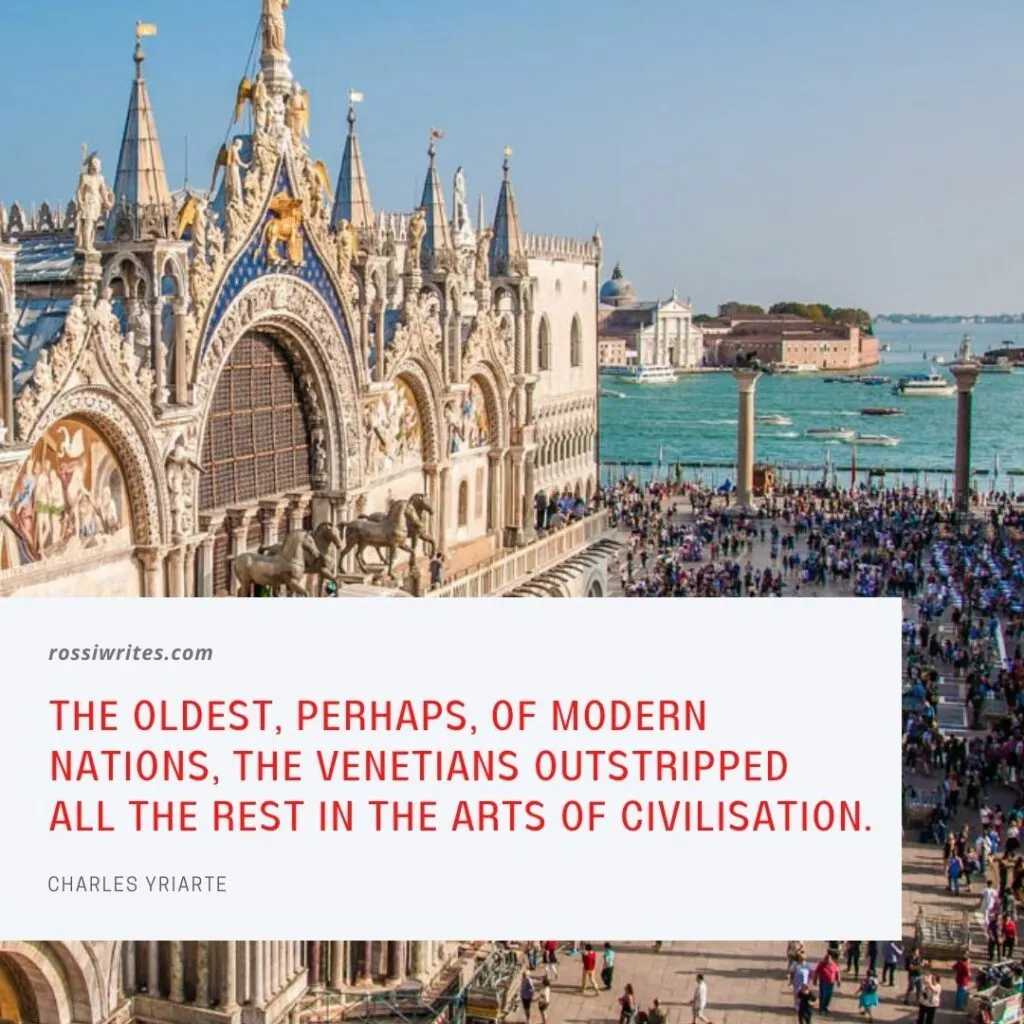
45. “The oldest, perhaps, of modern nations, the Venetians outstripped all the rest in the arts of civilisation. Before the tenth century, they had built on their group of islands no less than seventy churches, some of which, like those of Torcello, were miracles of art. They were the first to have the sense of luxury, to appreciate the refinements of life, the first to delight in sumptuous houses and tissues, in the splendour of gems and the sheen of pearls.”
– Venice – Its History, Art, Industries, and Modern Life by Charles Yriarte (1832-1898) – French writer, reporter, and editor. Read / Buy
46. “I have considered the quality of these Venetian gentlemen, who are for the most part persons of fair and comely presence, astute, and in their dealings very subtle, so that it is needful in your transactions with them to keep your eyes and ears open. They are proud; it is, I conceive, from the great empire which belongs to them; and when a son is born to a Venetian, the saying is: ‘a lord is born into the world.’
– Pilgrimage to Jerusalem in the Year 1494 by Pietro Casola (1427-1507) – Catholic canon and diarist from a noble family in Milan.
47. “The noblemen stalking with their ladys on choppines; these are high-heel’d shoes, particularly affected by these proude dames, or, as some say, invented to keepe them at home, it being very difficult to walk with them; whence one being asked how he liked the Venetian dames, replied, that they were mezzo carne, mezzo ligno, half flesh, half wood, and he would have none of them. The truth is, their garb is very odd, as seeming allwayes in masquerade ; their other habits also totaly different from all nations. They weare very long crisped haire, of severall strakes and colours, which they make so by a wash [in horse urine], dischevelling it on the brims of a broade hat that has no head, but an hole to put out their heads by ; they drie them in the sunn, as one may see them at their windows.”
– The Diary of John Evelyn by John Evelyn (1620-1706) – English writer, courtier, and prolific diarist. Read / Buy
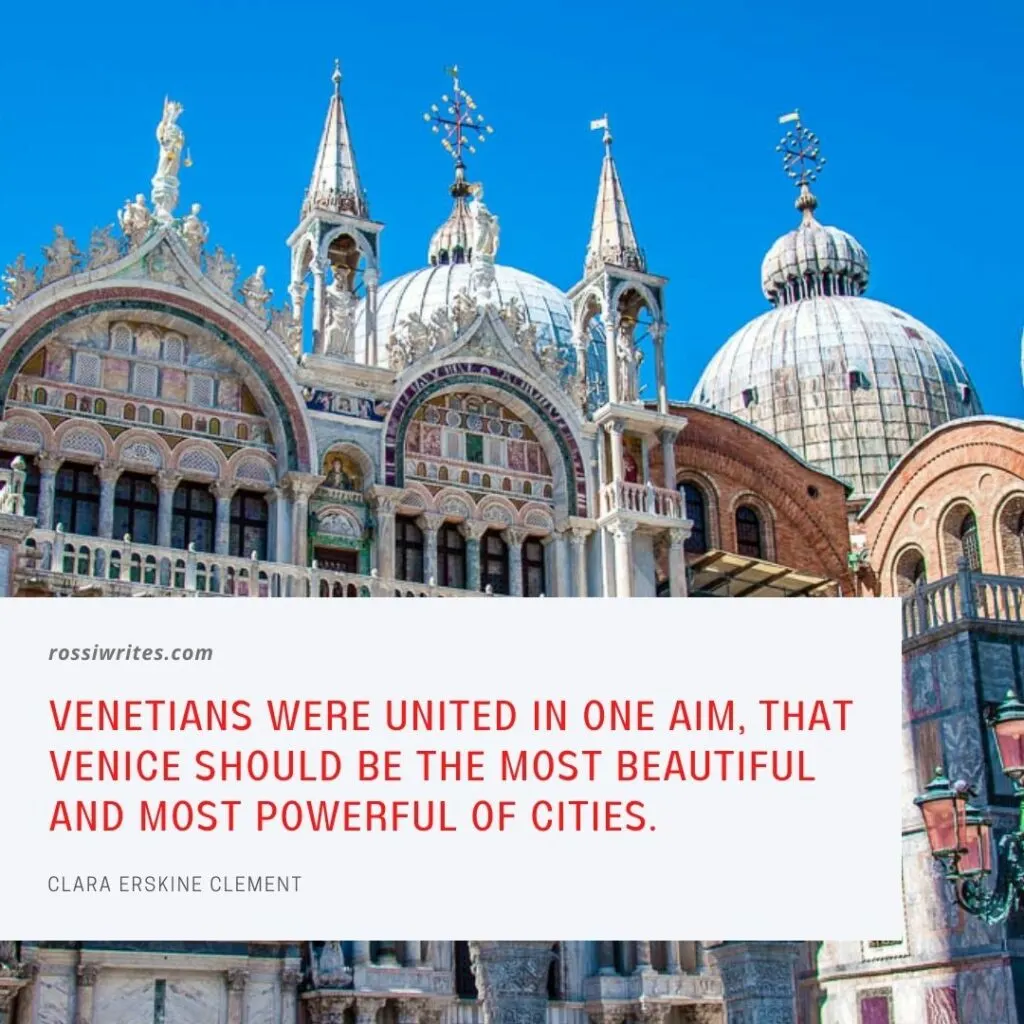
48. “At the beginning of the thirteenth century the Venetian nobility was the most powerful and opulent class in the world, as well as the most polished and enlightened, and were everywhere held in the highest consideration as men, soldiers, and diplomats. In the history of the Republic one fact stands forth prominently, – the devotion of Venetians to Venice, – devotion to the Republic, and to her elevation to the highest ideal of which they could conceive. […] Venetians were united in one aim, that Venice should be the most beautiful and most powerful of cities.”
– Venice: The Queen of the Adriatic by Clara Erskine Clement (1834-1916) – American author and traveller. Read / Buy
49. “Some ladies open their houses for conversazioni in the evening; but the usual style is for each lady to
have her circle, and the general drawing-room is the Opera-house; or they assemble in the Piazza of San Marco. There is a plentiful supply of chairs before the doors of the principal caffès, and they sit and converse. It is not etiquette for a lady to enter a caffè, and they are shocked at the English women, who do not perceive the difference between eating their ice, or sipping their coffee, in the open Piazza, and entering the shop itself.”
– Rambles in Germany and Italy in 1840, 1842 and 1843 by Mary Wollstonecraft Shelley (1797-1851) – English novelist and author of the Gothic novel Frankestein. Read / Buy
50. “He did not think the Venetian women so handsome by any means as he had heard they were, and yet he saw several of the most celebrated of those ladies who make a traffic of their beauty. He was exceedingly struck, indeed, as much so as with anything else, with the style in which some hundred and fifty or so of the principal courtesans live; their houses are kept up, and themselves maintained and dressed, quite as magnificently as though they were all princesses, and yet they have nothing to live upon but what they make by their profession.”
– The Works of Michael de Montaigne; Comprising His Essays, Letters, and Journey Through Germany and Italy by William Hazlitt (1834-1913) – English lawyer, bibliographer, editor, and writer. Michel de Montaigne (1533-1592) was one of the most significant philosophers of the French Renaissance. Read / Buy
51. The Venetian people have little to call their own – little more than the bare privilege of leading their lives in the most beautiful of towns. Their habitations are decayed; their taxes heavy; their pockets light; their opportunities few.
– Italian Hours by Henry James (1843-1916) – American-born British author. Read / Buy
Quotes about Venetian Gondolas and Gondoliers
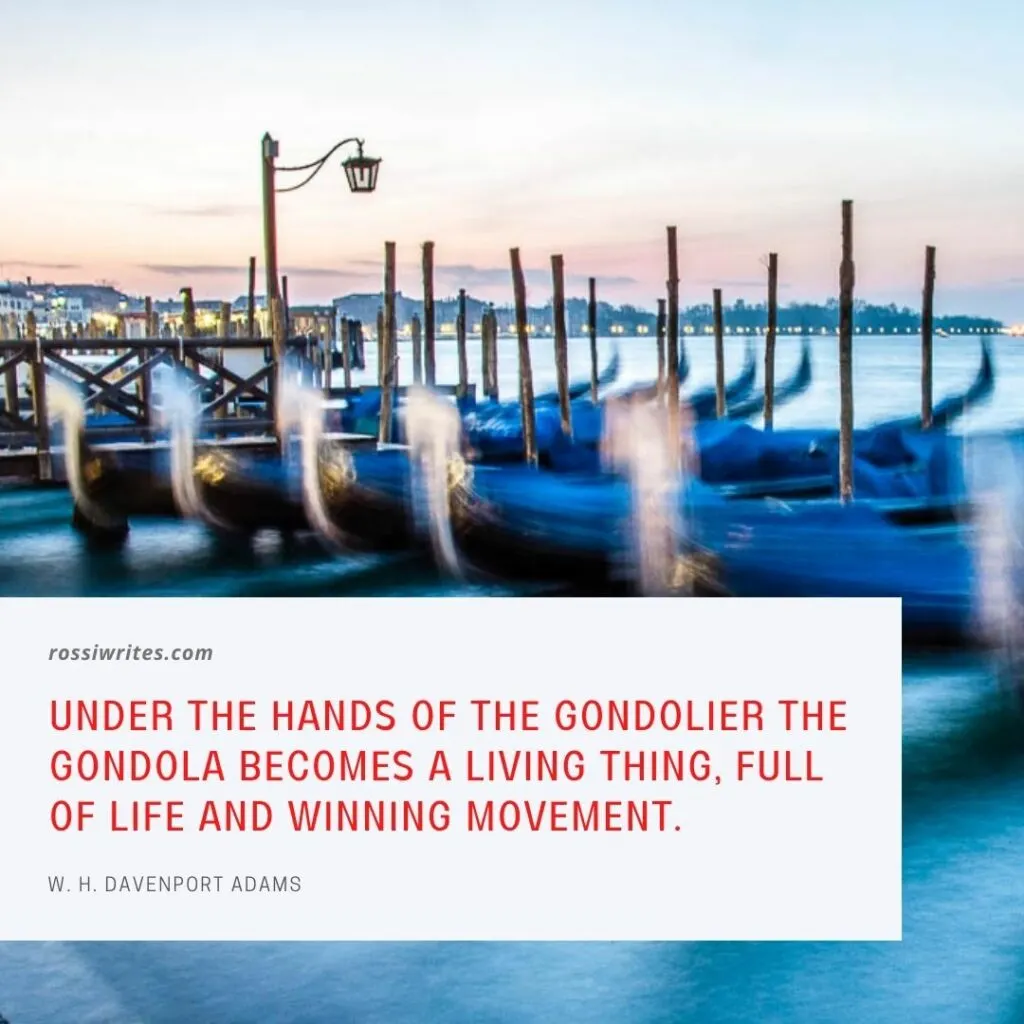
52. “Under the hands of the gondolier the gondola becomes a living thing, full of life and winning movement.”
– The Queen of the Adriatic; or, Venice, Past & Present by W. H. Davenport Adams (1828-1891) – English writer and journalist. Read / Buy
53. “A trip in a gondola is amongst the most thoroughly delightful and unspoiled of pleasures; but to appreciate it thoroughly it is necessary to become accustomed to its peculiar conditions, to throw off all sense of being an alien, to become thoroughly in touch with the spirit of the syren of the water; in a word, to dream, in a land of dreams, where everything seems more or less ethereal.”
– Venezia by Henriette Perl writing under the pen name Henry Perl (1845-1915) – Austrian writer. Read / Buy
54. “[…] there is no better or more delightful exercise for every muscle than standing and rowing a Gondola and not easy either […]”
– In a private letter by John Ruskin (1819-1900) – Scottish-English polymath, writer, art critic, and author of the seminal work The Stones of Venice
55. “I had heard so much of the canals and gondolas of Venice, that I was rather surprised to find that I could go by land to any part of the city, except the Giudecca. It is indeed sometimes round about, and the alleys, for there are no streets, are narrow, crooked, and intricate. Yet in this cold weather, I generally prefer encountering all their difficulties, to being half-frozen in a gondola. These gondolas, at least the smaller ones, consist of a wherry with a little black box, into which you must enter backwards because it would be exceedingly difficult to turn round. They are rowed by one man, who places his oar, not behind, but at the side; and it is surprising with what dexterity he will direct his boat, by means so apparently insufficient. The larger boats have of course two rowers, but in all cases they stand to row, looking forward, and throwing the whole weight of their body on the oar.”
– Letters of an Architect from France, Italy, and Greece Volume 1 by Joseph Woods (1776-1864) – English architect, botanist, and geologist. Read / Buy
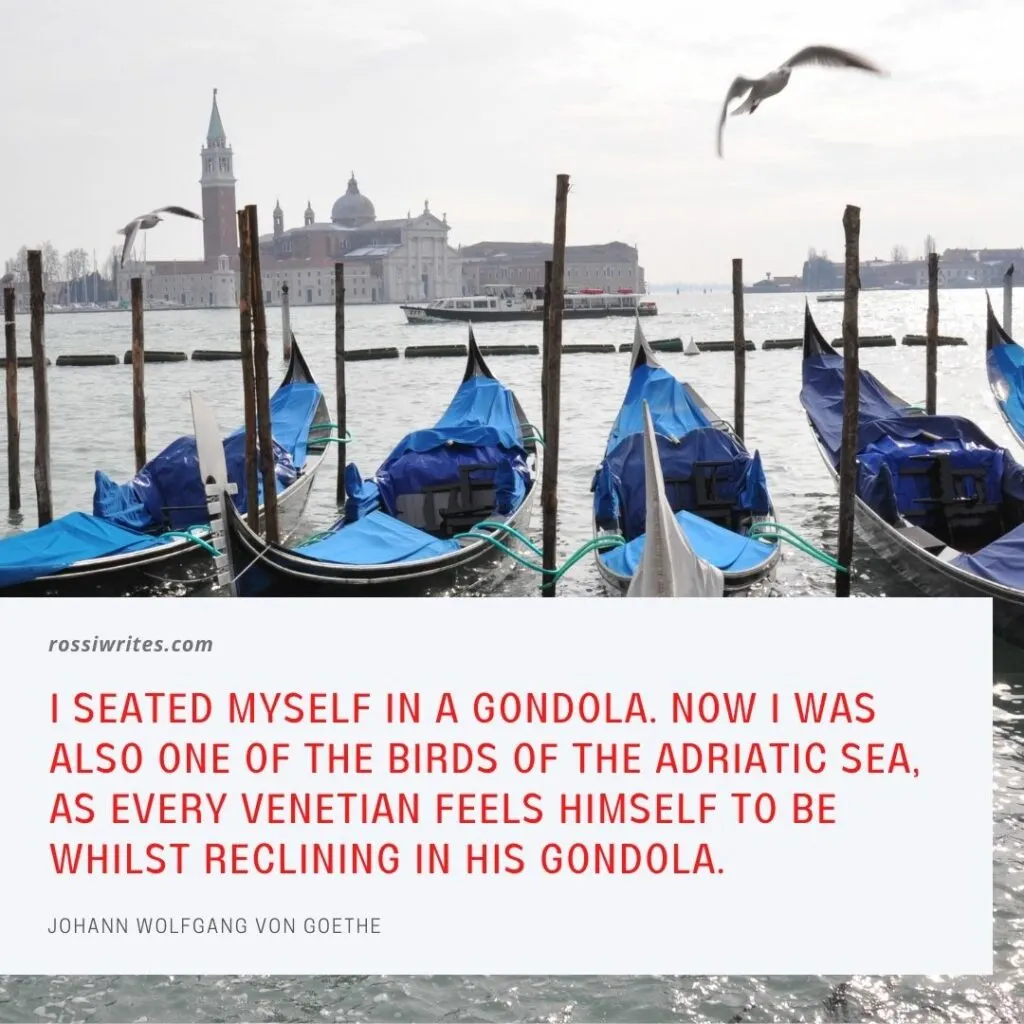
56. “I seated myself in a gondola […]. Now I was also one of the birds of the Adriatic Sea, as every Venetian feels himself to be whilst reclining in his gondola.”
– Letters from Switzerland and Travels in Italy by Johann Wolfgang von Goethe (1749-1832) – German poet, novelist, playwright, and scientist. Read / Buy
57. “Gondolas doing everything, carrying casks, coal, lumber, lime, stone, flour, bricks, and boxed supplies generally, and others carrying vegetables, fruit, kindling and flowers. Only now I saw a boat slipping by crowded with red geraniums. […] Here comes a gondolier now, peddling oranges. The music of his voice!”
– A Traveler at Forty by Theodore Dreiser (1871-1945) – American novelist and journalist. Read / Buy
58. “The black gondolas glide along like biers or cradles, the last and the first beds of humankind. At night, their dark colour renders them invisible, and they are only traced by the reflection of the lights they carry – one might call them phantoms, guided by faint stars.”
– Corinna, Or Italy by Madame de Staël (1766-1817) – Swiss-French writer and philosopher. Read / Buy
59. “Who would not have to suppress a fleeting shudder, a vague timidity and uneasiness, upon boarding a Venetian gondola for the first time or after several years? The strange craft […] with that peculiar blackness which is found elsewhere only in coffins – it suggests silent, criminal adventures in the rippling night, it suggests even more strongly death itself, the bier and the mournful funeral, and the last silent journey. And has it been observed that the seat of such a barque, this arm-chair of coffin-black veneer and dull black upholstery, is the softest, most luxuriant, most lulling seat in the world?”
– Death in Venice by Thomas Mann (1875-1955) – German novelist, social critic, and Nobel Prize in Literature laureate. Read / Buy
60. “The Venetian gondola is as free and graceful, in its gliding moment, as a serpent. It is twenty or thirty feet long, and is narrow and deep, like a canoe; its sharp bow and stern sweep upward from the water like the horns of a crescent with the abruptness of the curve slightly modified.
The bow is ornamented with a steel comb with a battle-ax attachment which threatens to cut passing boats in two occasionally, but never does. The gondola is painted black because in the zenith of Venetian magnificence the gondolas became too gorgeous altogether, and the Senate decreed that all such display must cease, and a solemn, unembellished black be substituted.”
– The Innocents Abroad by Mark Twain (1835-1910) – American writer, humorist, and publisher. Read / Buy
61. “The gondolier is a picturesque rascal […]. His attitude is stately; he is lithe and supple; all his movements are full of grace. When his long canoe, and his fine figure, towering from his high perch of the stern, are cut against the evening sky, they make a picture that is very novel and striking to a foreign eye.”
– The Innocents Abroad by Mark Twain (1835-1910) – American writer, humorist, and publisher. Read / Buy
62. “My gondola followed the course of the small canals; like the mysterious hand of a Genie leading me through the maze of this oriental city […].”
– Remembrance of Things Past by Marcel Proust (1871-1922) – French novelist, critic, and essayist.
Quotes about Venice’s’ Contribution to the Sciences, Book Publishing, Arts, and Music
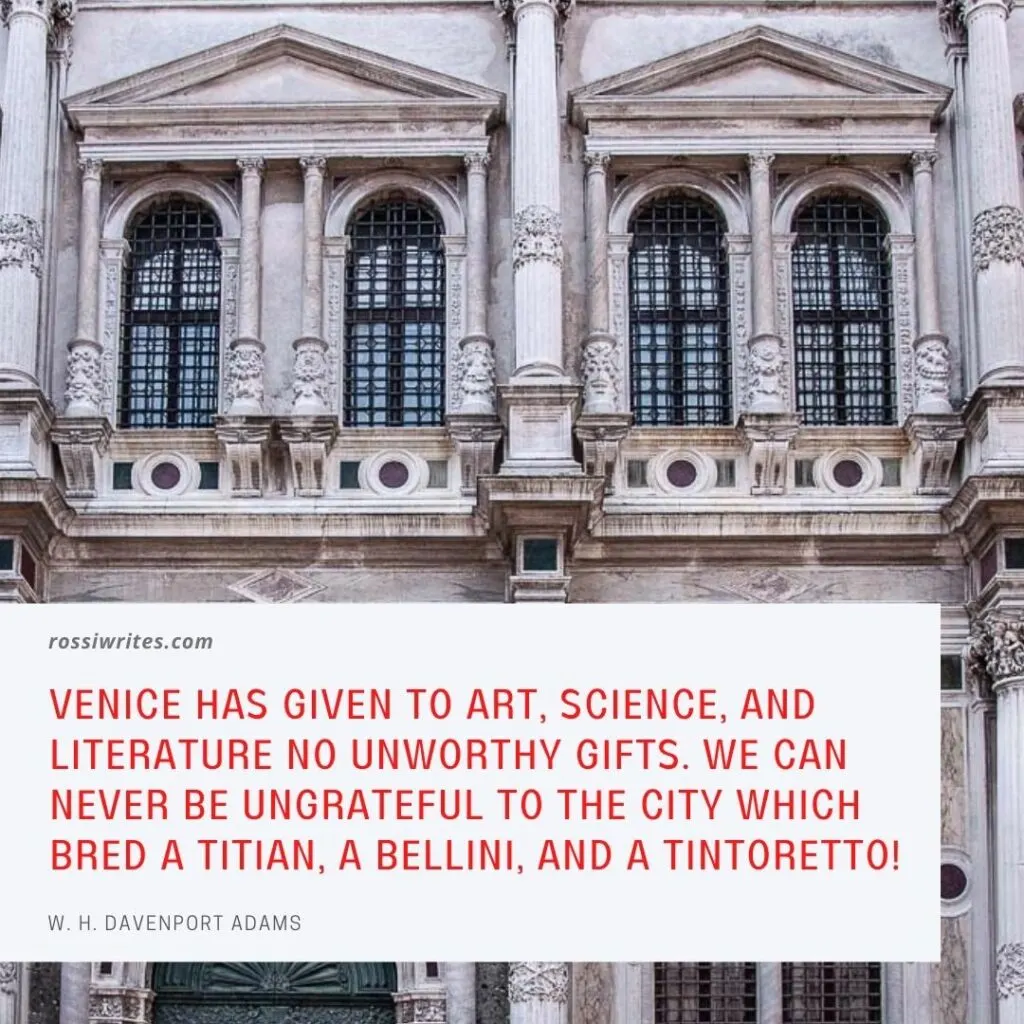
63. “Venice has given to Art, Science, and Literature no unworthy gifts. We can never be ungrateful to the city which bred a Titian, a Bellini, and a Tintoretto, a Marco Polo and a Friar Paul, an Aldus Manutius, a Goldoni, and a Canova! In every field of knowledge as of enterprise she has shone conspicuous, and her triumphs in peace are not less renowned than the victories of her sword.”
– The Queen of the Adriatic; or, Venice, Past & Present by W. H. Davenport Adams (1828-1891) – English writer and journalist. Read / Buy
64. The Government [of Venice] was perpetually adopting some fresh precaution against epidemics. During the Plague of 1348, a Committee of three Sages had been deputed to concert all necessary and possible measures for arresting the evil; and in 1423 the first Lazzaretto was established. The successive developments, which this novel and admirable Institution received, greatly helped to improve the health of [Venice] and to diminish the rate of mortality. In 1467, […] a Hospital with 100 wards was built at the public expense […]; and this building became known as the New Lazzaretto.
– History of the Venetian Republic: Her Rise, Her Greatness, and Her Civilisation Vol. 4 by W. Carew Hazlitt (1834-1913) – English lawyer, bibliographer, editor, and writer. Read / Buy
65. “In establishing themselves in the East, where they founded houses of business, the Venetians learnt Greek, and one of them, Jacopo, was the first translator of Aristotle. Constantinople being put to fire and sword, the men of science and letters, were to be seen emigrating from thence, carrying their ancient manuscripts with them. Florence became the Athens of Italy, and Venice followed the movement. Thanks to Guarino, one of her Veronese subjects, she came early to the knowledge of Xenophon, Pindar, Strabo, Lucian, Arrian, Procopius, Diodorus Siculus, and Plato. […]
The Venetians were in due time seized with a passion for literature and philosophy. Barbaro devoted himself to Aristotle, Romulus Amaseus to Xenophon and Pausanias, Donato to Xenophon, Jerome Ramnusius translated Avicenna, and Malherbe, a monk of the Camaldolese order, made the first Italian translation of the Bible.”
– Venice – Its History, Art, Industries, and Modern Life by Charles Yriarte (1832-1898) – French writer, reporter, and editor. Read / Buy
66. “The Venetians were great bibliophiles and readers. Soon after the discovery of the art of printing, Venice became its most important centre in Italy. By the end of the fifteenth century more books had been published in Venice than in Rome, Milan, Florence and Naples put together. […] In 1490 the great humanist, Teobaldo Pio Manuccio of Rome (Aldus Manutius, or, as he wrote himself, Aldus Romanus), chose Venice as the most appropriate city for the achievement of his stupendous design of editing and printing the whole of the Greek classics.”
– Venice and Its Story by Thomas Okey (1852-1935) – English self-taught scholar, Professor of Italian at Cambridge University, and expert on basket weaving. Read / Buy
67. “Venetian Painting has three glories – Colour, Reality, Beauty. Its masters played on the emotions through an intuitive sense of Colour, as composers sway the heart by music. To pass from their pictures to those of other schools is like passing from the glow and luxuriance of June to November, with its sepia bleakness. The Venetians used Colour with superb largess, but never to excess: they never added it for effect […]. It flows as naturally from their pencils, as from Nature in a rose garden.”
– A Short History of Venice by William Roscoe Thayer (1859-1923) – American author and editor specialising in Italian history. Read / Buy
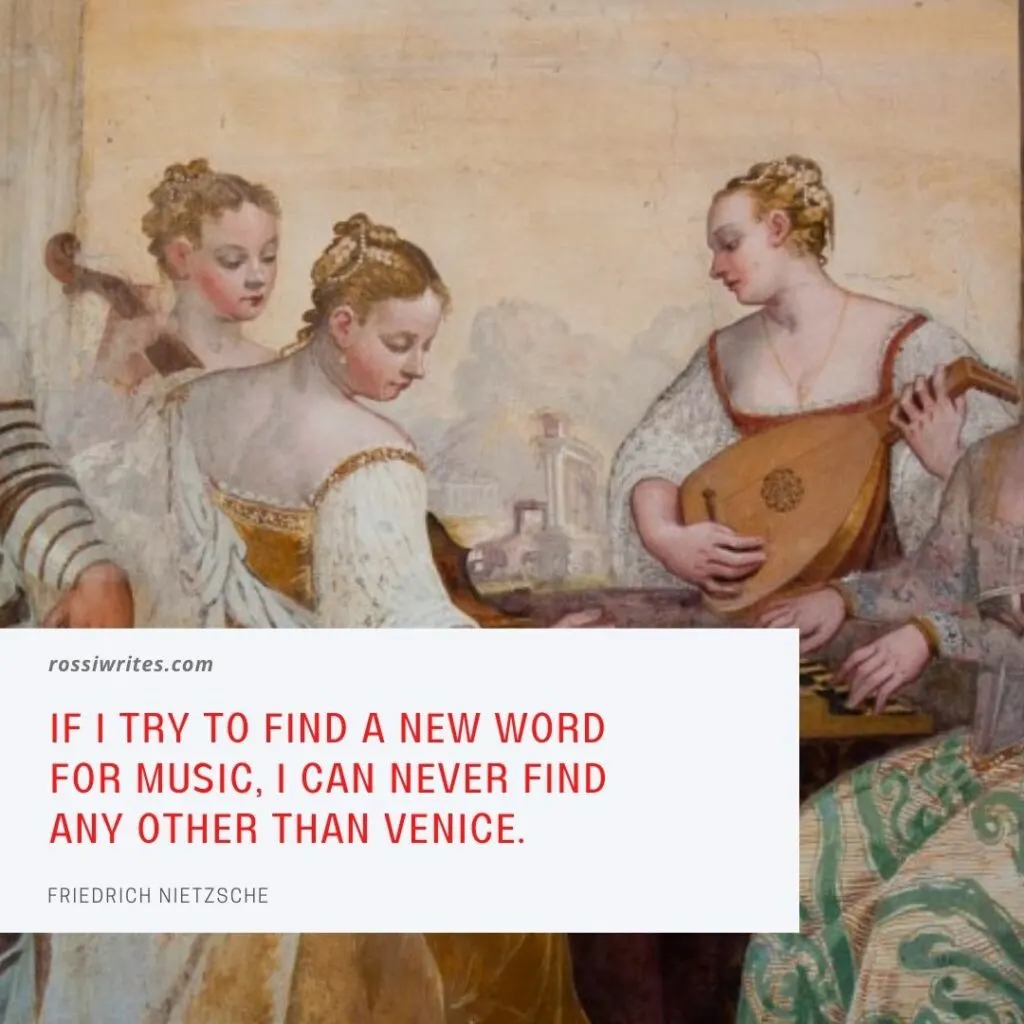
68. “If I try to find a new word for music, I can never find any other than Venice.”
– Ecce Homo by Friedrich Nietzsche (1844-1900) – German philosopher, cultural critic, and philologist. Read / Buy
69. “Venice […] How shall I freeze after this sun! Here I am a gentleman, at home a parasite.”
– In a private letter sent from Venice by Albert Dürer (1471-1528) – German printmaker, painter, and theorist of the German Renaissance.
70. “Not a single evening goes by without a concert somewhere. The people run along the canal to hear it, with such passion that you would suppose that they had never heard anything like it before. You cannot imagine how crazy the city is about this art.”
– In a letter by Charles de Brosses (1709-1777) – French aristocrat and writer.
71. “The Conservatorio di Musica is a Venetian invention and in its origin was a purely [charitable] institution; and the musical conservatories of Venice flourished generations before similar establishments were dreamt of in other parts of the Continent.
Venice had at one time so many [orphaned] children under her charge, that, like the old woman who lived in a shoe, she didn’t know what to do with them. (…) The Most Serene determined, in its wisdom, that they all should be taught music – vocal, if they had any voices, instrumental, if they had hands; both if they had one and the other. At least, they argued, he who can play on the fiddle need never starve.”
– Rome and Venice with Other Wanderings in Italy, in 1866-7 by George Augustus Sala (1828-1895), English author and journalist. Read / Buy
72. “The music, which according to my taste, is far superior to that of the opera, and which has not its like, either in Italy or the rest of the world, is that of the scuole. The scuole are charitable institutions, founded for the education of young girls without means, who are subsequently portioned by the Republic [of Venice] either for marriage or for the cloister. Amongst the accomplishments cultivated in these young girls music holds the first place. […] I cannot imagine anything so voluptuous, so touching as this music. “
– The Confessions of Jean-Jacques Rousseau (1712-1778) – Genevan philosopher, writer, and composer. Read / Buy
Quotes about the Venetian Language
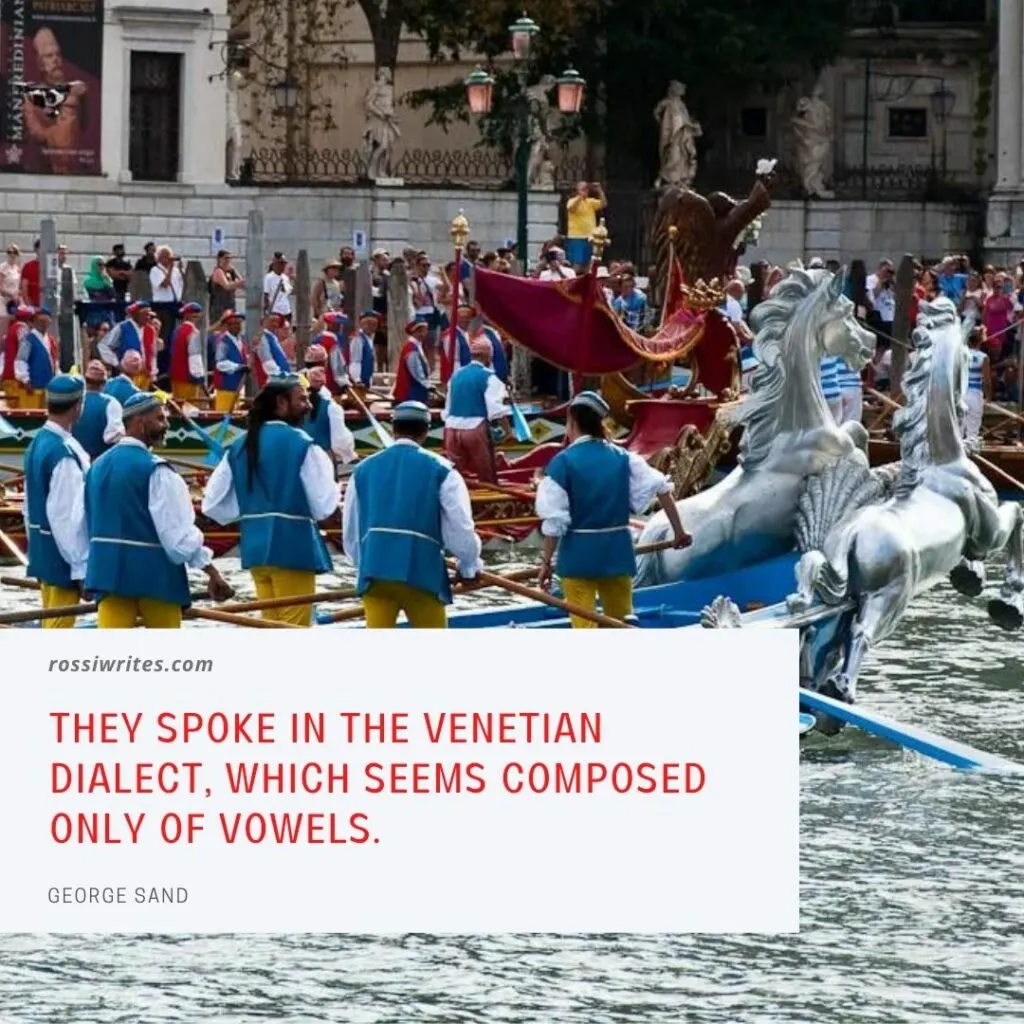
73. “They spoke in the Venetian dialect, which seems composed only of vowels, and which the Romans and Florentines, when they first hear it, cannot always understand.”
– Consuelo by George Sand (1804-1876) – French novelist, memoirist, and journalist. Read / Buy
74. “Italian is the only tongue whose dialects are almost languages of themselves. In that of each state, books might be written distinct from the standard Italian; though only the Neapolitan, Sicilian, and Venetian dialects have yet the honour of being acknowledged; and that of Venice as the most original, most graceful of all.”
– Corinna, Or Italy by Madame de Staël (1766-1817) – Swiss-French writer and philosopher. Read / Buy
75. “The still water carries the voice, and good Venetians exchange confidences at a distance of half a mile. […] Their delightful garrulous language helps them to make Venetian life a long conversazione. This language, with its soft elisions, its odd transpositions, its kindly contempt for consonants and other disagreeables, has in it something peculiarly human and accommodating.”
– Italian Hours by Henry James (1843-1916) – American-born British author. Read / Buy
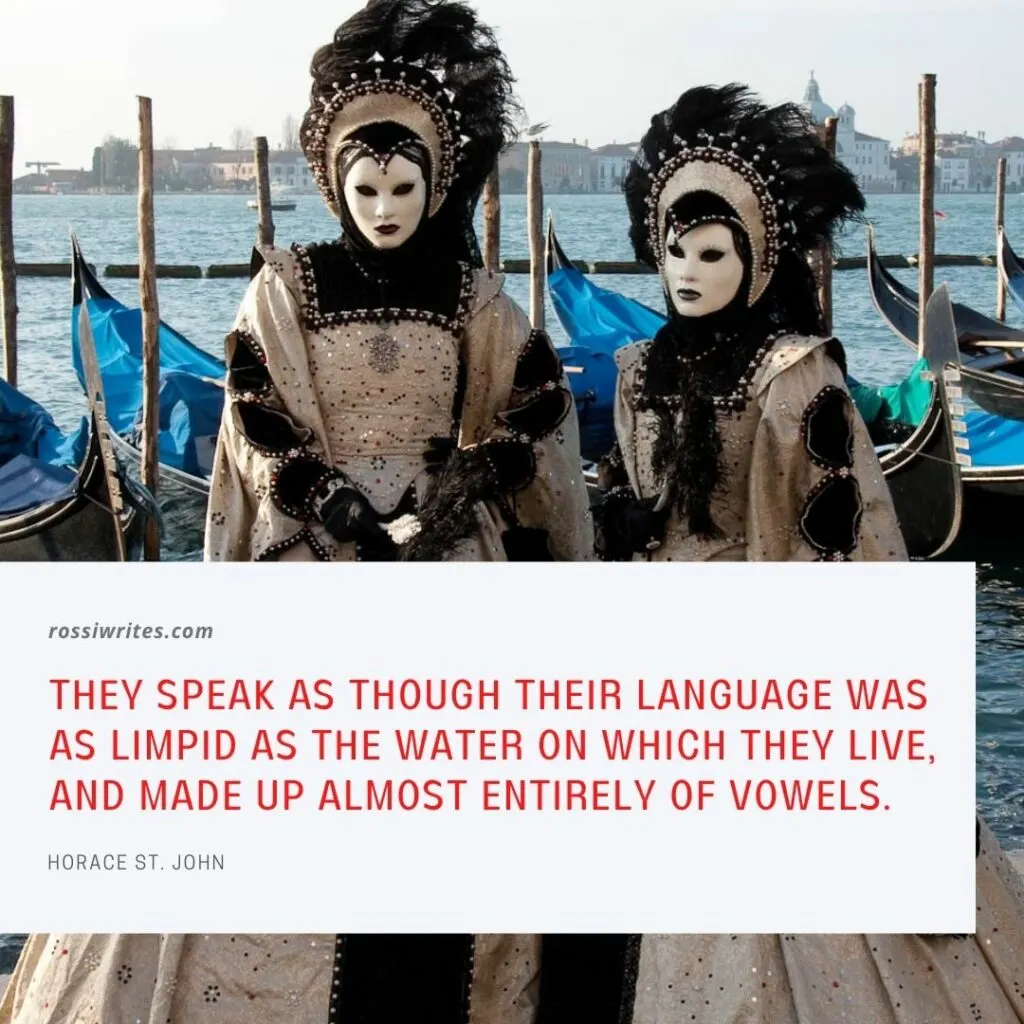
76. “They speak as though their language was as limpid as the water on which they live, and made up almost entirely of vowels.”
– Plebeian Life in Venice by Horace St. John (1830-1888) – French-English journalist, editor, and author. The essay was published in the book ‘With the World’s Great Travellers’. Read / Buy
77. “No horses, no wagons, no clanging of cars. Just the patter of human feet. You listen here and the very language is musical. The voices are soft. Why should they be loud? They have nothing to contend with.”
– A Traveler at Forty by Theodore Dreiser (1871-1945) – American novelist and journalist. Read / Buy
78. “The Venetians, sailing to the East for their commerce, […] greatly assimilated their way of living and even their costume to the luxury and voluptuousness of Asia; so also in their language, songs, and harmonies they brought back evident marks of the lands visited or conquered. The Venetian dialect corresponds with the Ionic character in the softness of the sounds and abundance of final diphthongs; and possesses a sort of singing quality and lengthening of the vowels […].”
– The Basilica of Saint Mark in Venice by Camillo Boito (1836-1914) – Italian architect, engineer, art critic, art historian, and novelist.
Quotes about Venice’s Landmarks and Its Unique Urban Fabric
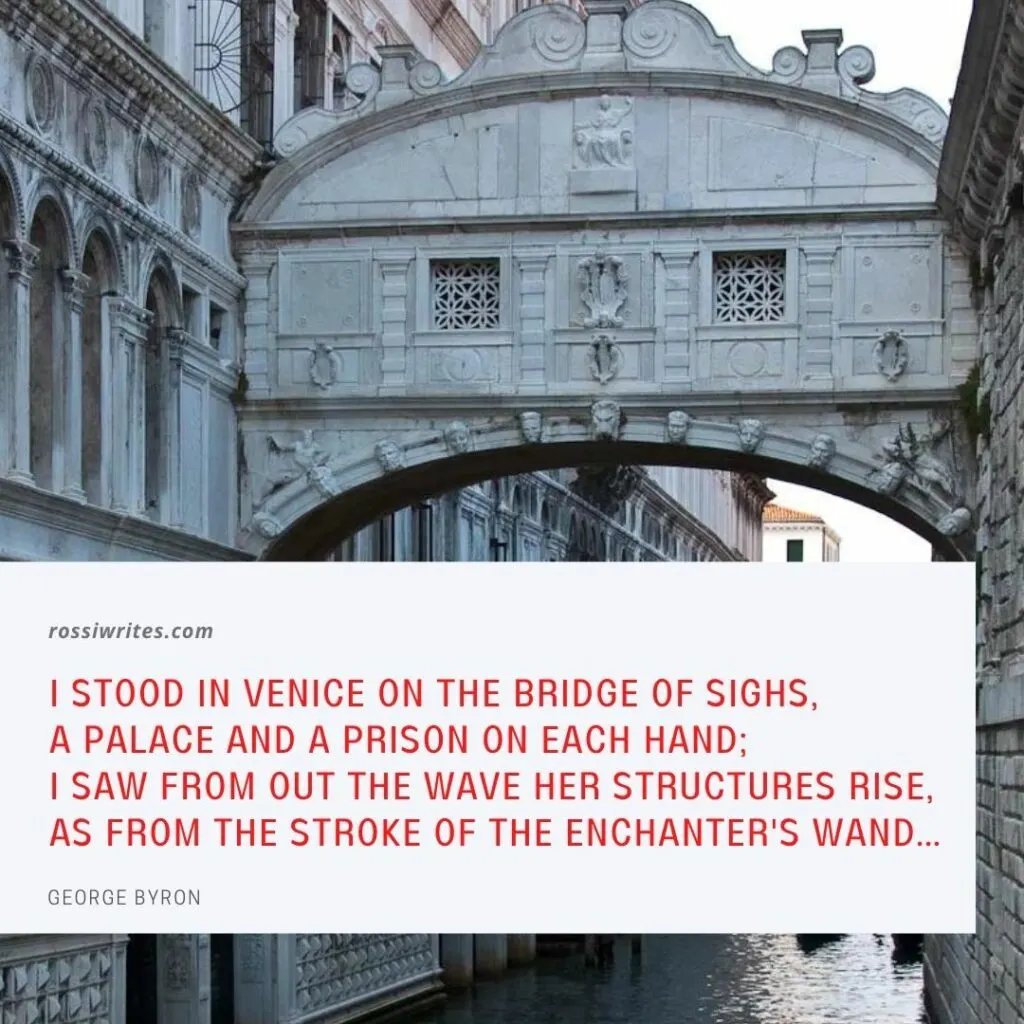
79. “I stood in Venice on the Bridge of Sighs,
A palace and a prison on each hand;
I saw from out the wave her structures rise,
As from the stroke of the enchanter’s wand (…)”
– Childe Harold’s Pilgrimage by George Byron (1788-1824) – English poet and aristocrat. Read / Buy
80. “The morning after my arrival I repaired to the Square of St. Mark, which I entered by a sudden turn under some arcades, and on the first burst, it appeared to me the most magnificent thing I had ever seen. Had I been suddenly transported there from some distant place, I should have known at once where I was, from the views I had seen of it. The strange-looking church and the great ugly Campanile could not be mistaken; but although I had an idea of the architecture, I had none of the effect.”
– Letters of an Architect from France, Italy, and Greece Volume 1 by Joseph Woods (1776-1864) – English architect, botanist, and geologist. Read / Buy
81. “The porticoes [of St. Mark’s Square] are daily frequented by Florentine, Genoese, and Milanese merchants, by those from Spain and Turkey, and all the other different nations of the world, who assemble here in such vast multitudes that this piazza is celebrated amongst the first in the universe.”
– Venezia, citta’ nobilissima e singolare – Jacopo Sansovino (1486-1570) – Italian sculptor, architect, and author. Read (in Italian)
82. “Accordingly, I spent the late hours either on the water (the moonlight of Venice is famous) or in the splendid square which serves as a vast forecourt to the strange old Basilica of Saint Mark. I sat in front of Florian’s cafe, eating ices, listening to music, talking with acquaintances: the traveller will remember how the immense cluster of tables and little chairs stretches like a promontory into the smooth lake of the Piazza. The whole place, of a summer’s evening, under the stars and with all the lamps, all the voices and the light footsteps on marble (the only sounds of the arcades that enclose it), is like an open-air saloon dedicated to cooling drinks and to a still finer degustation – that of the exquisite impressions received during the day.”
– The Aspern Papers by Henry James (1843-1916) – American-born British author. Read / Buy
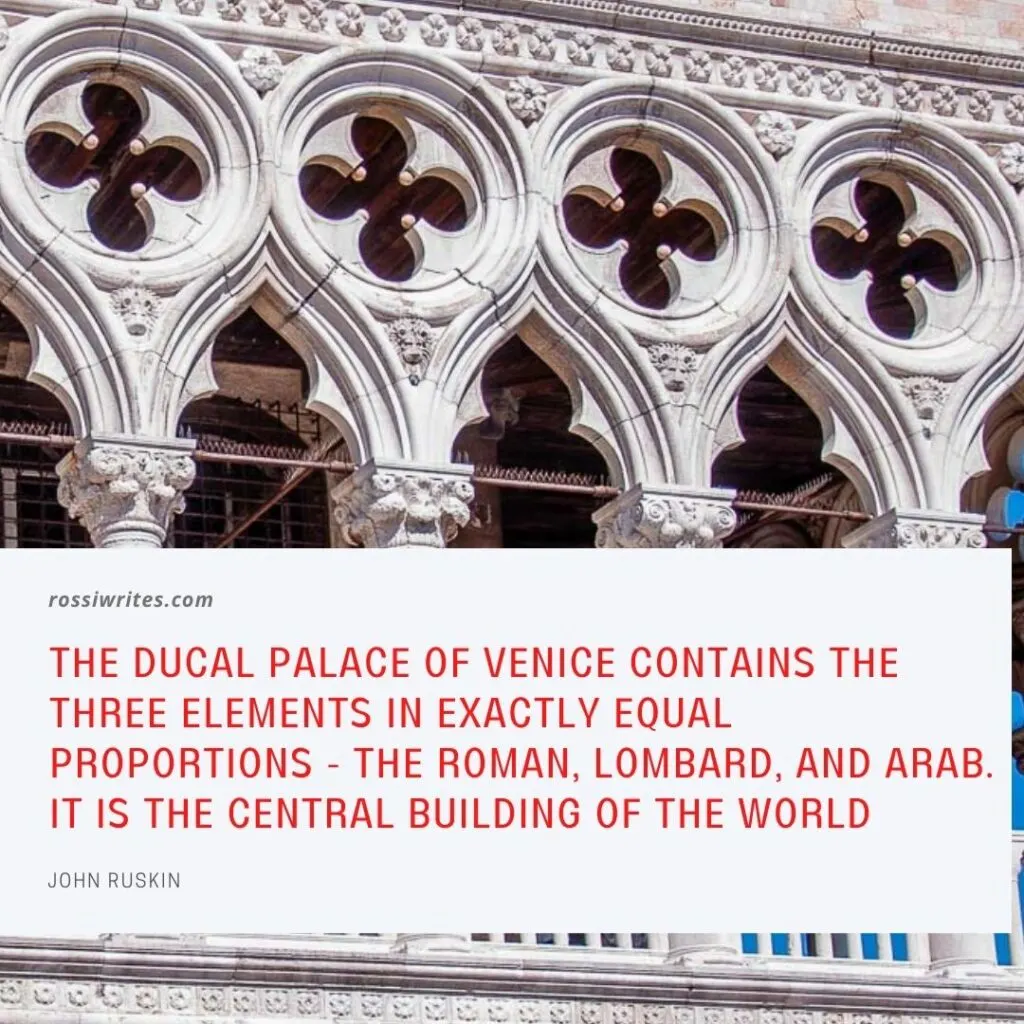
83. “The Ducal Palace of Venice contains the three elements in exactly equal proportions – the Roman, Lombard, and Arab. It is the central building of the world.”
– The Stones of Venice by John Ruskin (1819-1900) – Scottish-English polymath, philosopher, and art critic. Read / Buy
84. “It has already been mentioned in these pages, that the city of Venice is divided into two nearly equal parts, by a channel much broader than that of the ordinary passages of the town. This dividing artery, from its superior size and depth, and its greater importance, is called the Grand Canal. Its course is not unlike that of an undulating line, which greatly increases its length. As it is much used by the larger boats of the bay – being, in fact, a sort of secondary port – and its width is so considerable it has throughout the whole distance but one bridge – the celebrated Rialto.”
– The Bravo by James Fenimore Cooper (1789-1851) – American writer of historical romances most famous for his masterpiece The Last of the Mohicans. Read / Buy
85. “The celebrated Grand Canal […], more often called the Canalazzo, the course of which, as is well known, forms the letter S, and is more than two miles long, is one huge monument, for from out of its silent waters rise up some six hundred large and small buildings, the imposing rows of windows of which are hidden at night behind the massive scuri, or outside shutters, literally “darkness makers”, converting the houses they belong to into the semblance of a great mausoleum.”
– Venezia by Henriette Perl writing under the pen name Henry Perl (1845-1915) – Austrian writer. Read / Buy
86. “They proceeded to the Arsenal: before its gates are two Grecian lions, brought from Athens, to become guardians of Venetian power. Motionless guardians, that defend but what they respect. This repository is full of marine trophies. The famous ceremony of the Doge’s marriage with the Adriatic, in fact, all the institutions, here attest their gratitude to the sea: in this respect, they resemble the English […].
– Corinna, Or Italy by Madame de Staël (1766-1817) – Swiss-French writer and philosopher. Read / Buy
87. “It is a fault in most descriptions, that while the stranger hears so much of the canals of Venice, but little is said of her streets: still, narrow, paved, commodious, and noiseless passages, of this description, intersect all the islands, which communicate with each other by means of a countless number of bridges. Though the hoof of a horse or the tumbling of a wheel is never heard in these strait avenues, they are of great resort for all the purposes of ordinary intercourse.”
– The Bravo by James Fenimore Cooper (1789-1851) – American writer of historical romances most famous for his masterpiece The Last of the Mohicans. Read / Buy
Quotes about Crowding and Overtourism in Venice
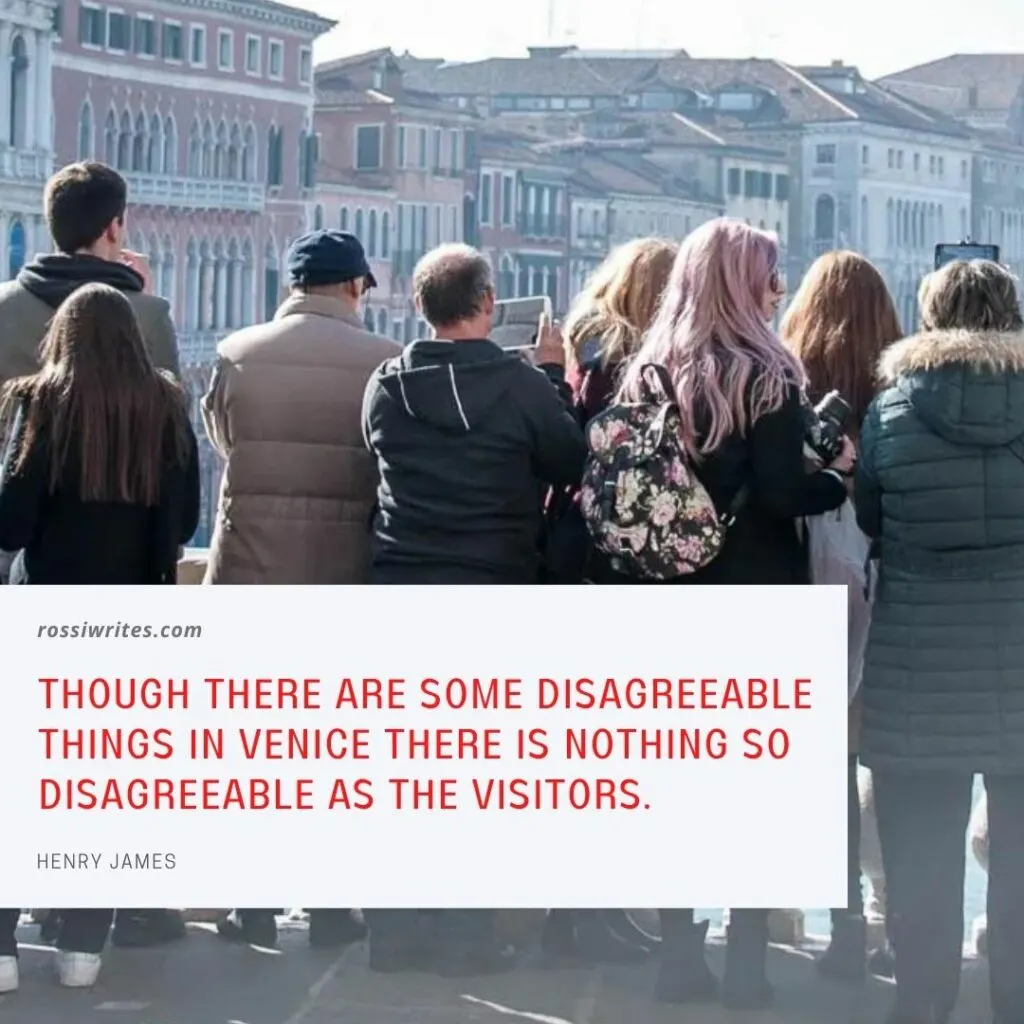
88. “Though there are some disagreeable things in Venice there is nothing so disagreeable as the visitors.”
– Italian Hours by Henry James (1843-1916) – American-born British author. Read / Buy
89. “The sentimental tourist’s sole quarrel with his Venice is that he has too many competitors there. He likes to be alone; to be original; to have (to himself, at least) the air of making discoveries. The Venice of today is a vast museum where the little wicket that admits you is perpetually turning and creaking, and you arch through the institution with a herd of fellow-gazers. There is nothing left to discover or describe, and originality of attitude is completely impossible. […] But this is not the fault of Venice; it is the fault of the rest of the world.”
– Italian Hours by Henry James (1843-1916) – American-born British author. Read / Buy
90. “This was a holiday-place of all holiday-places. […] Too many people in the piazza, too many limbs and trunks of humanity on the Lido, too many gondolas, too many motor-launches, too many steamers, too many pigeons, too many ices, too many cocktails, too many menservants wanting tips, too many languages rattling, too much, too much sun, too much smell of Venice, too many cargoes of strawberries, too many silk shawls, too many huge, raw-beef slices of watermelon on stalls: too much enjoyment, altogether far too much enjoyment!”
– Lady Chatterley’s Lover by D.H. Lawrence (1885-1930) – English writer and poet.
Quotes about the Islands in the Venetian Lagoon
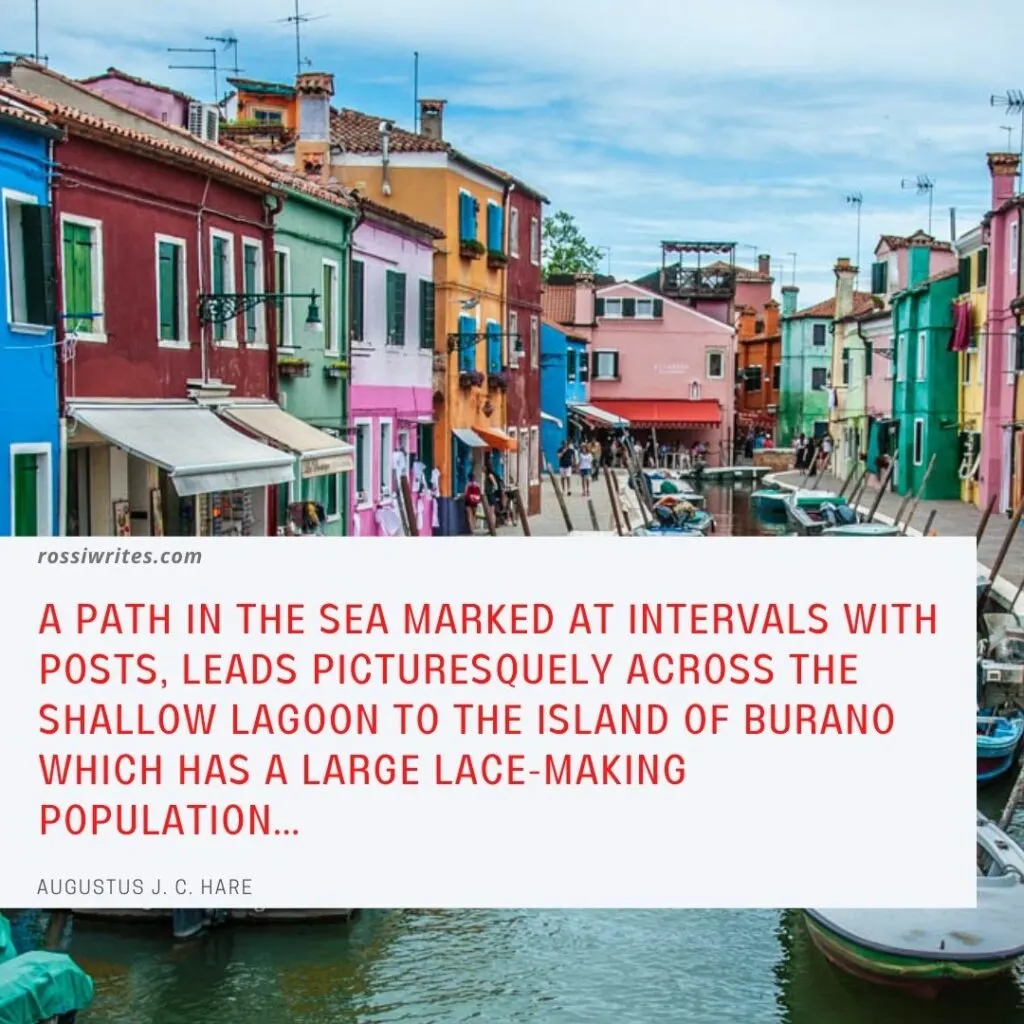
91. “A path in the sea, marked at intervals with posts, leads picturesquely across the shallow lagoon to the Island of Burano which has a large lace-making population, and beyond this to the Island of Mazzorbo, which is a vast kitchen-garden for the inhabitants of Venice.”
– Cities of Northern and Central Italy by Augustus J. C. Hare (1834-1903) – English writer. Read / Buy
92. “Murano […] is a Venice on a small scale.”
– Letters from Switzerland and Travels in Italy by Johann Wolfgang von Goethe (1749-1832) – German poet, novelist, playwright, and scientist. Read / Buy
93. “Three days after, I return’d to Venice, and pass’d over to Murano, famous for the best glasses of the world, where having viewed their furnaces and seene their worke, I made a collection of divers curiosities and glasses, which I sent for England by long sea. […]
Besides that Murano is itselfe a very nobly built Towne, and has divers noblemen’s palaces in it and very handsome gardens.”
– The Diary of John Evelyn by John Evelyn (1620-1706) – English writer, courtier, and prolific diarist. Read / Buy
94. “Most ancient and important was the art of the glassworker, peculiarly favoured by the abundance of fine sand and of a marine flora rich in alkaline products. In the thirteenth century so great was the expansion of the industry that it was deemed prudent to transfer the many furnaces working night and day from Rialto to Murano. […] Wondrous stories are told of the subtle art of the craftsmen who were famed to make goblets so sensitive that they would betray by fracture the presence of poison.”
– Venice and Its Story by Thomas Okey (1852-1935) – English self-taught scholar, Professor of Italian at Cambridge University, and expert on basket weaving. Read / Buy
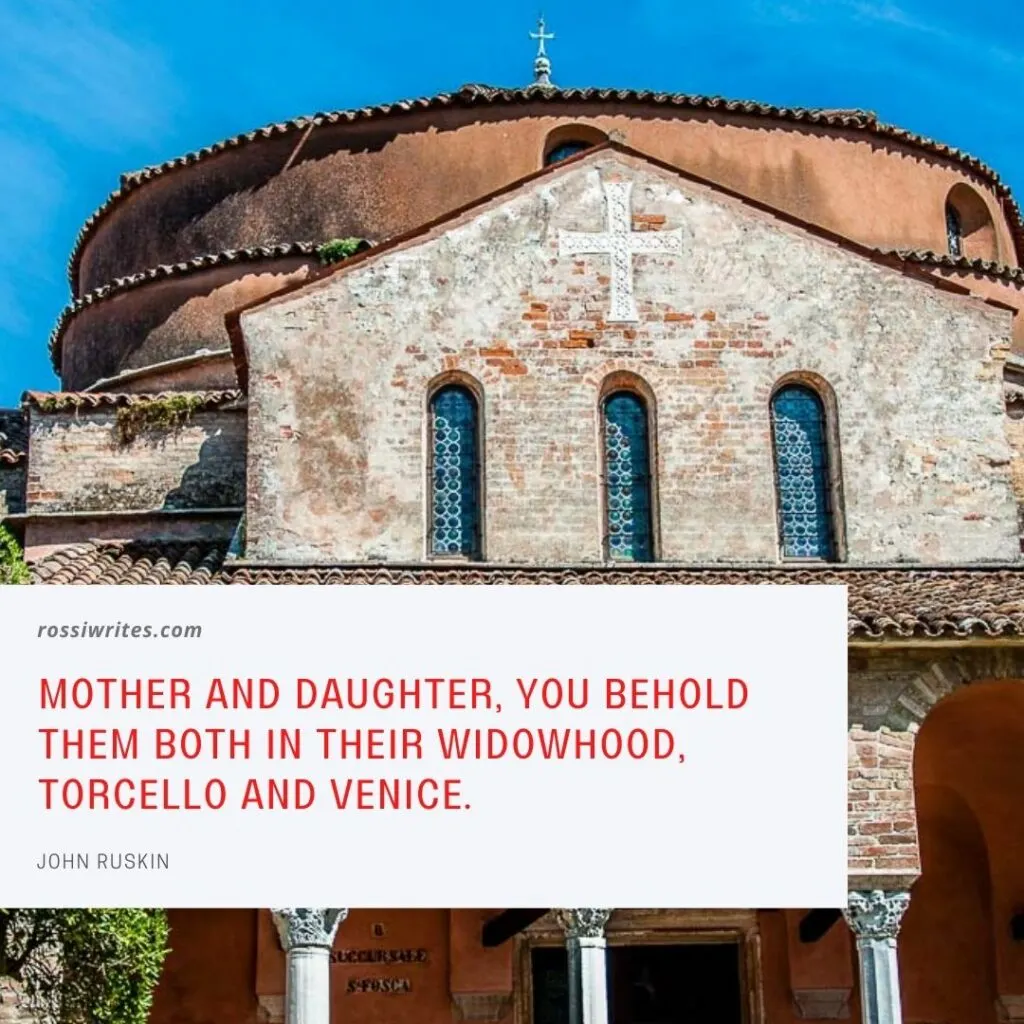
95. “Mother and daughter, you behold them both in their widowhood, Torcello and Venice.”
– The Stones of Venice by John Ruskin (1819-1900) – Scottish-English polymath, philosopher, and art critic. Read / Buy
96. “A delicious day, from morning to night. I have been towards Chioggia, as far as Pellestrina, where are the great structures called ‘Murazzi’ which the Republic has ordered to be raised against the sea. They are of hewn stone, and properly are intended to protect from the fury of the wild element the tongue of land, called the ‘Lido’ which separates the lagunes from the sea.”
– Letters from Switzerland and Travels in Italy by Johann Wolfgang von Goethe (1749-1832) – German poet, novelist, playwright, and scientist. Read / Buy
97. “[To round off the day] ferry across to the island of S. Giorgio Maggiore, the ancient Isle of the Cypresses, and, after visiting the church, ascend the campanile and enjoy the beautiful view from the summit. Northwards is the line of the mainland, fringed with trees and dotted with villages; in the foreground the broad curve of the city of a hundred isles; around, as the eye sweeps the horizon, are the lagoons, studded with islands and marked by the bold strokes of the lidi; farther to the south is the open Adriatic. As the sun sinks to its setting the vast expanse will glow in a symphony of ravishing colour.”
– Venice and Its Story by Thomas Okey (1852-1935) – English self-taught scholar, Professor of Italian at Cambridge University, and expert on basket weaving. Read / Buy
Quotes about Traditional Venetian Celebrations
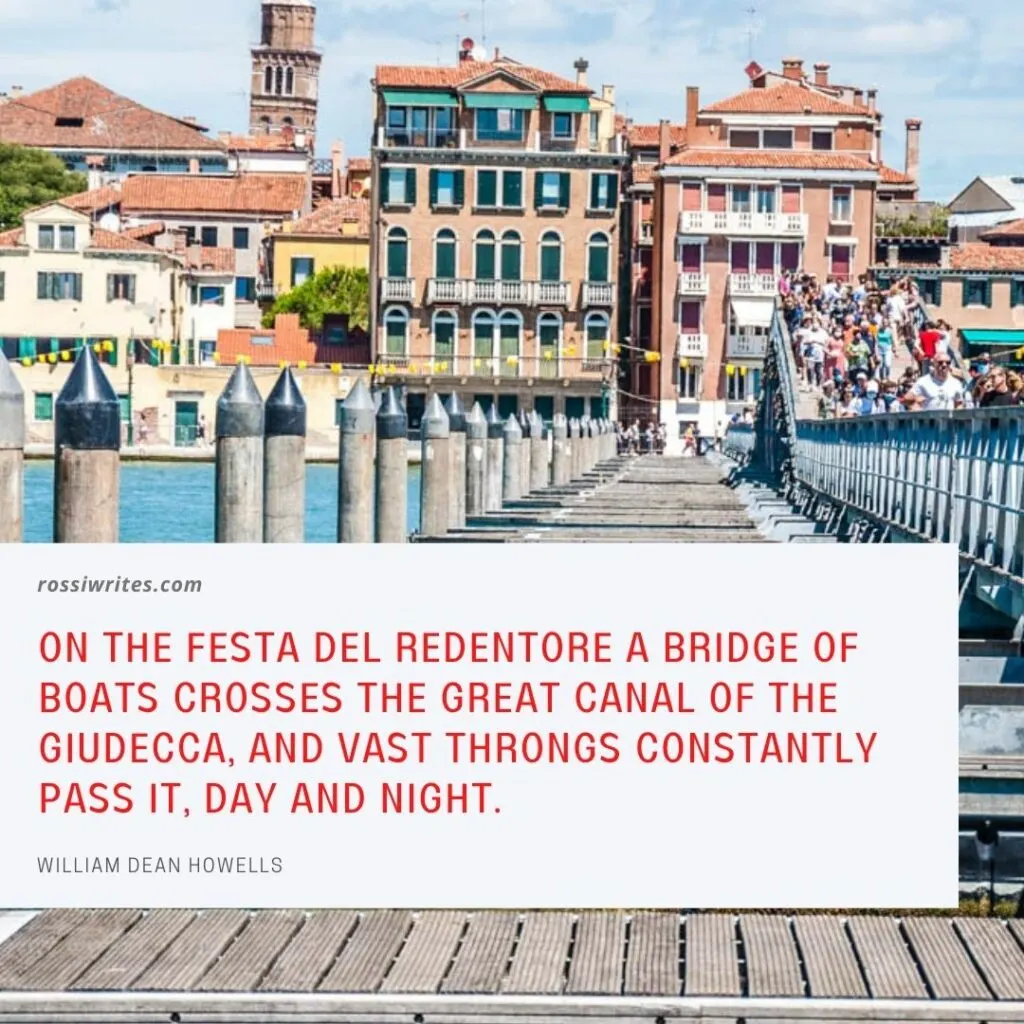
98. “On the Festa del Redentore (the third Sunday of July) a bridge of boats crosses the great canal of the Giudecca, and vast throngs constantly pass it, day and night. […] Yet the Festa del Redentore has now none of the old-time gaiety it wore when the Venetians thronged the gardens, and feasted, sang, danced, and flirted the night away, and at dawn went in their fleets of many-lanterned boats, covering the lagoon with fairy light, to behold the sunrise on the Adriatic Sea.”
– Venetian Life by William Dean Howells (1837-1920) – American journalist, realist novelist, literary critic, and playwright. Read / Buy
99. “The national character of the Venetians was largely influenced by the display of the frequent festivals of the Republic. […] They formed part of the aristocratic polity of the old commonwealth, which substituted popular indulgence for popular liberty, and gave the people costly pleasures in return for the priceless rights of which they had been robbed, set up national pride in the place of patriotism, and was as well satisfied with a drunken joy in its subjects as if they had possessed a true content[ment].”
– Venetian Life by William Dean Howells (1837-1920) – American journalist, realist novelist, literary critic, and playwright. Read / Buy
100. “I stirred not from Padoa till Shrovetide, when all the world repair to Venice to see the folly and madnesse of the Carnevall; the women, men, and persons of all conditions disguising themselves in antiq dresses, with extravagant musiq and a thousand gambols, traversing the streetes from house to house, all places being then accessible and free to enter. Abroad, they fing eggs fill’d with sweete water, but sometimes not over sweete. They also have a barbarous costome of hunting bulls about y streetes and piazzas, which is very dangerous, the passages being generally narrow. The youth of the several wards and parishes contend in other masteries and pastimes, so that ’tis impossible to recount the universal madnesse of this place during this time of licence.
– The Diary of John Evelyn by John Evelyn (1620-1706) – English writer, courtier, and prolific diarist. Read / Buy
101. “The ceremony of the marriage with the sea is certainly the most characteristic of all the public ceremonies peculiar to Venice. It is held on the Day of the Sensa {i.e. Ascension}. […] The Patriarch blesses the marriage-ring, – a gold ring of which the signet is made of three materials, onyx, lapis-lazuli and malachite, and which is engraved with a book as the emblem of St. Mark. He then presents the ring to the Doge; an assistant priest, standing by with a great vase of holy water pours this into the sea, and into the ripples where it falls the Doge drops the marriage ring with these sacramental words: ‘Sea, we espouse thee, in a sign of true and everlasting dominion!’.”
– Venice – Its History, Art, Industries, and Modern Life by Charles Yriarte (1832-1898) – French writer, reporter, and editor. Read / Buy
102. “In Venice, each festa has its appropriate viand {i.e. item of food}. During carnival, all the butter and cheese shop windows are whitened with the snow of beaten cream – panamontata. At San Martino, the bakers parade troops of gingerbread warriors. Later, for Christmas, comes mandorlato, which is a candy made of honey and enriched with almonds. In its season only can any of these devotional delicacies be had.”
– Venetian Life by William Dean Howells (1837-1920) – American journalist, realist novelist, literary critic, and playwright. Read / Buy
Venetian and Italian Proverbs and Sayings about Venice
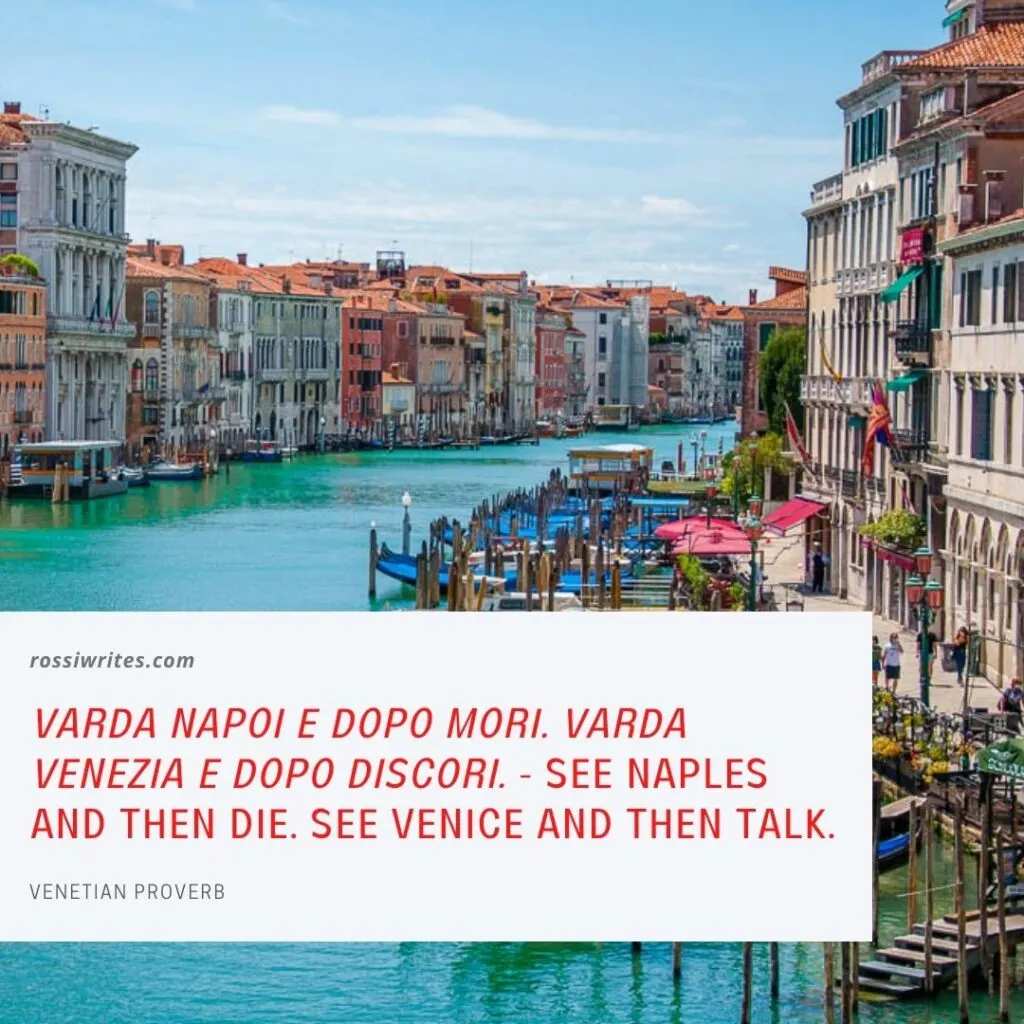
103. Varda Napoi e dopo mori. Varda Venezia e dopo discori. – See Naples and then die. See Venice and then talk.
104. Se piove a la Sensa par quaranta giorni no semo sense. – If it rains on Ascension Day, it will continue raining for 40 days.
105. Venezia bela fabricà sul mar, chi no la pol vedar no la pol stimar. – Venice is beautiful, built on the sea, who cannot see it cannot appreciate it
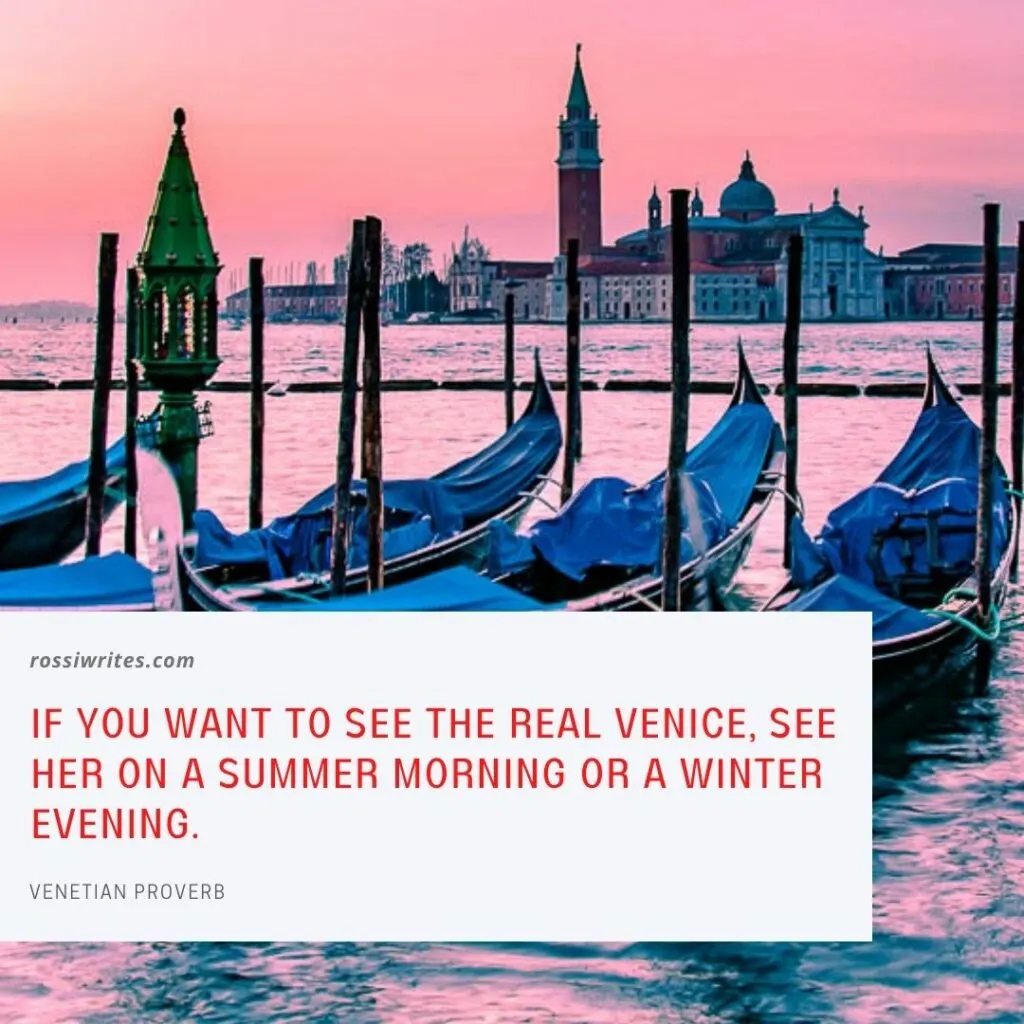
106. Chi vol vedar Venezia vera de istà a la matina, de inverno a la sera. – If you want to see the real Venice, see her on a summer morning or a winter evening.
107. Chi non le fa de Carneval, le fa de Quaresema. – If you don’t let loose during Carnival, you will blow a fuse during Lent.
108. Tira su che Venessia se nega! – Blow your nose, otherwise, Venice will flood. (Used when someone keeps sniffing instead of using a tissue to blow their nose.)
109. Trovarse tra Marco e Todaro. – Translated literally as ‘finding yourself between Mark and Theodore’, this is the Venetian version of the proverb ‘between a rock and a hard space’. It comes from the practice in ancient times to execute criminals between the two iconic pillars on Piazetta San Marco in Venice. On top of one of the pillars is the winged lion of St. Mark – the Patron Saint of Venice. The other pillar is crowned by a statue of St. Theodore of Amasea and a crocodile. St. Theodore was Venice’s first patron. He is known for slaying a demon-possessed crocodile in Egypt.
In Conclusion
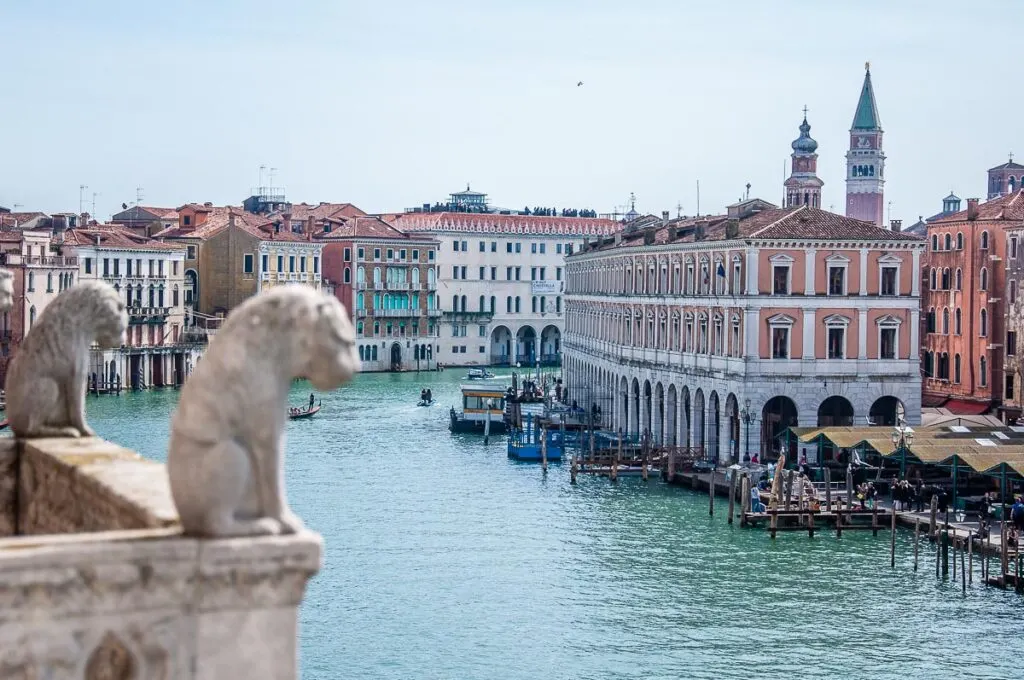
Venice in Italy is one of the world’s most famous destinations. Rising from the water in the heart of the Venetian Lagoon and crisscrossed by hundreds of canals, the city intrigues the imagination, attracts millions of people, and as if by magic charms your soul and makes you fall in love.
For centuries, poets, historians, politicians, art critics, and travellers have been visiting Venice and trying to capture its essence in words. Nowadays, we can look back, delve into their heartfelt observations, and experience Venice just like they did centuries or decades ago.
Their expressive words give us a deeper understanding of the unique character, history, and location of Venice. They help crystallise our own thoughts and emotions about the City of Water in our own words.
In this blog post, I have organised in several thematic groups some of the best and most inspiring quotes about the city of Venice and the Venetian Lagoon. They were written by eminent Italian, European, and American thinkers, writers, and philosophers.
Over the last 15 years, I have been researching and reading books about Venice as one of my most constant and deepest interests. Here, I have included my favourite quotes about the intriguing and unique City of Canals.
You may have come across my compilation when searching for quotes on Venice, curious facts about Venice, or even captions about Venice to use on Instagram and social media. I have no ownership over these Venice quotes and I have carefully checked and double-checked to see if they are in the public domain before including them with lots of love and admiration in my blog post.
My ultimate goal is to bring attention to some of the best words and books ever written about Venice. This is why I have provided links to both free and paid-for resources for the different books so that the knowledge contained in them can be enjoyed by attentive and appreciative readers again and again.
Thank you for reading and for getting to know Venice through the eyes and the words of some of the greatest authors of the past.
Enjoy falling under Venice’s spell both in your imagination and in real life!
I hope that the quotes about Venice in this blog post will inspire you to write your own words about the beautiful City of the Lagoon!
Now, get ready quick for your visit to Venice in Italy!
- Consult these guidebooks.
- Buy plane tickets to Italy.
- Book train tickets, bus tickets or rent a car.
- Research accommodation.
- Select tours and activities.
More Helpful Venice Info for You
Venice: Essential Tips, Major Landmarks, Hidden Gems, How to Navigate Venice, Venice in a Day for Art Lovers, Train Stations, Nearest Airports, Best Tours, Boats in Venice, Haunted Venice, Day Trips from Venice, Arco del Paradiso
Venice Videos: Grand Canal, St. Mark’s Square at Carnival, St. Mark’s Square, View from Rialto Bridge, View from Accademia Bridge, Venetian gondolas, Historical Regatta, Squero di San Trovaso, Palazzo Contarini del Bovolo, Fondazione Querini Stampalia, Palazzo Grimani, Rialto Fish Market, Ca’ Macana, Festa della Madonna della Salute
Thank you for reading! Please, leave me a comment, pin the images or use the buttons right at the top and at the end of this blog post to share it on social media.
For more useful information like this, please, like my blog’s page on Facebook and subscribe to my strictly no-spam newsletter.
Pin This Blog Post!
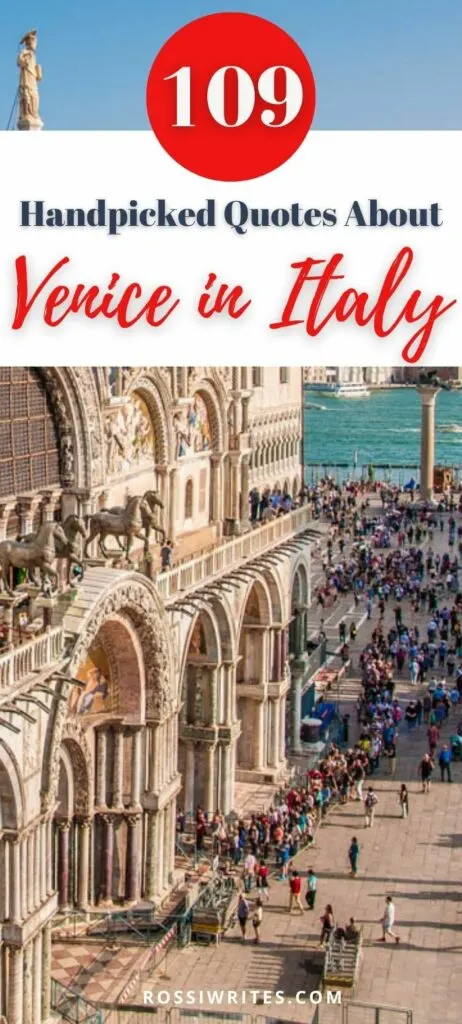
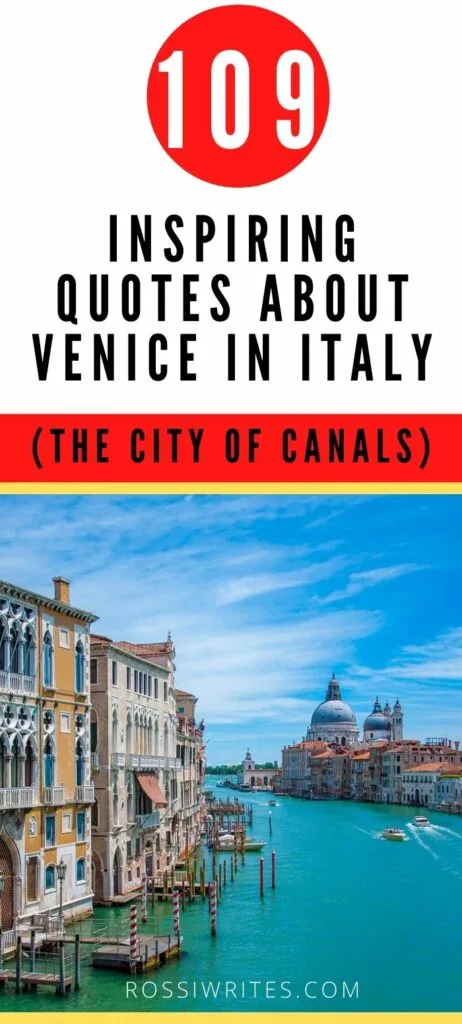

Alisa
Saturday 19th of March 2022
Pulling all of these together was an inspiring idea, and I'm looking forward to seeing Venice again with fresh eyes.
And I WILL be seeing it; we're being transferred to Vicenza this year! :D
admin
Saturday 19th of March 2022
Thank you for your kind words! Have a wonderful time in Vicenza! It's so close to Venice, Padua, and Verona - you will be spoilt for choice for things to do and see.
Best wishes,
Rossi :)
Brian Neale
Saturday 19th of March 2022
I Love Venice it is one of my favourite cities visited Venice twice once by my self and once with my mother and friends who were holidaying not far from our Hotel in Sabiadora Pineta Italy
admin
Saturday 19th of March 2022
Venice is always a good idea! I am glad you had a great time visiting it!
Best wishes,
Rossi :)